Travels with Dick and Karen
South Africa
Part 2
Namaqua: flowers and shores of the west coast |
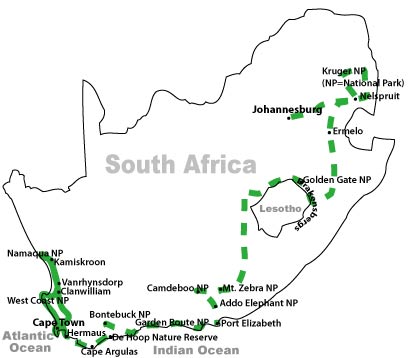 |
| We finally headed out of Cape Town. People descending upon cars at insections to hawk their wares was common. But we only found one case during the whole trip (in the Drakensbergs) where a simple "no, thank you" was not sufficient to move them on. |
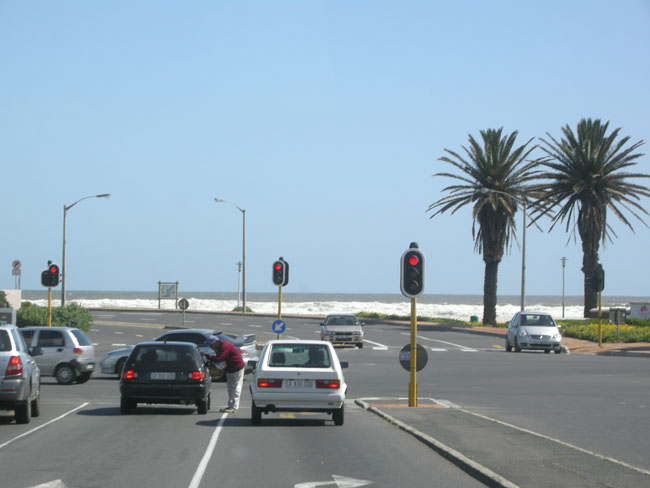 |
We were skirting the coast as paved roads allowed. Although there were few tarred roads, there were lots of flower reserves. Here we come! |
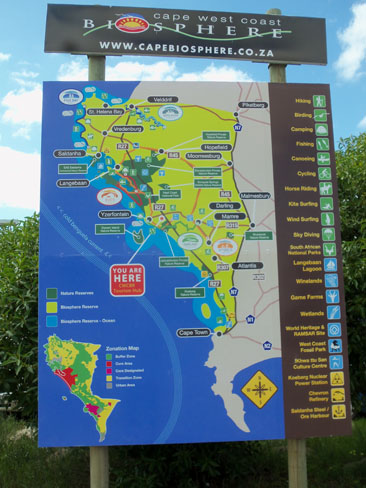 |
| Looking back across Table Bay to Cape Town, Table Mountain and spiky Lion's Head. |
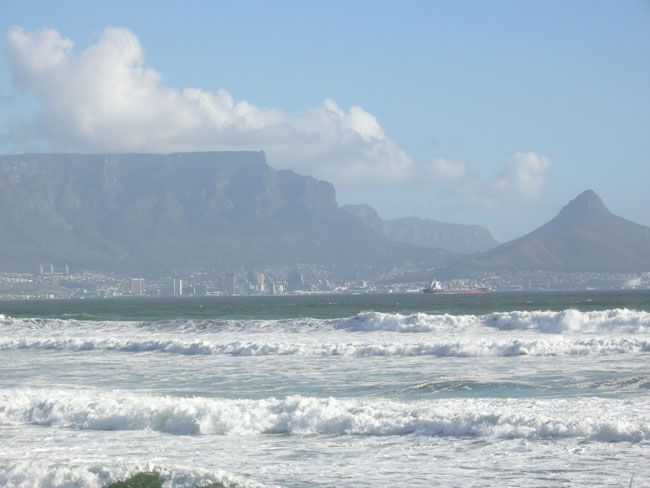 |
and looking north, with flowers.
I'd better add a note about the flower photos: we had over 6,000 images when we got home. In selecting which ones to include for this essay we tried to leave in enough to give you a flavor of the trip and the magic of being so constantly surrounded by masses of blooms without boring you. Feel free to scroll past when you've reached saturation. If you want more you only have to ask... |
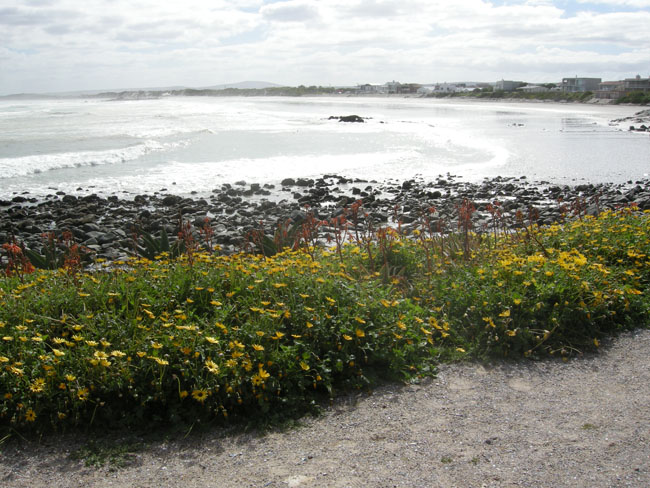 |
| Our first campground in Ou Skip, with the sound of surf faintly in the background. |
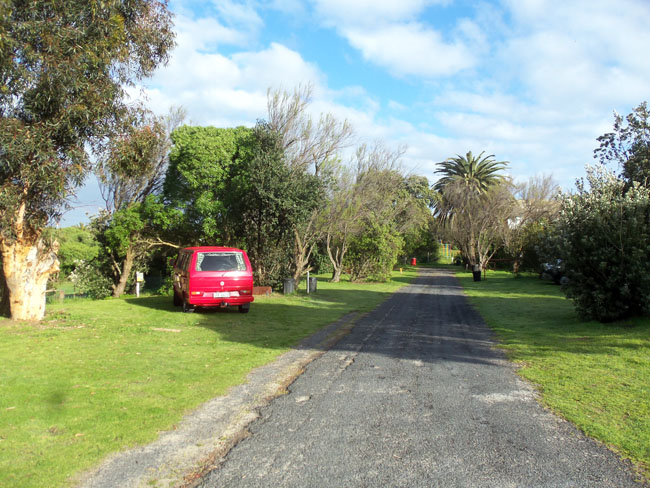 |
| Inside our "home" Karen lingers before getting up. A note about our VW: Lekker Campers had built their own interior. This shot is looking towards the van's rear window. The doors on the left wall are a short closet (with rod and hangers). The pillows are located above the rear engine compartment, which gave us pre-warmed bedding at the end of a cold day... or the end of a hot day, too.
If desired, the bed could be erected into a full bench seat, but we left it in "bed" mode for the duration of the trip. Although the van was scheduled to include down pillows and comforters, Lekker took our allergies into account and provided non-allergenic bedding and an extra blanket. We also took the precaution of buying a third blanket (green, of course!). |
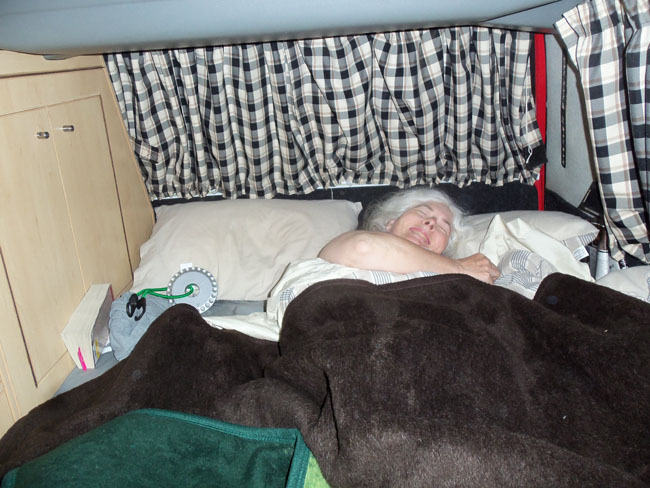 |
| The microwave and fridge in our breakfast setup.
The microwave was not standard Lekker equipment, so we did as planned and purchased one during our first day's drive. Each campsite had power available, and that allowed us to run the fridge overnight without draining the van's battery. This also shows more of the cabinetry: the amount of out-of-sight space Lekker's conversion provided was amazing. Our two emptied suitcases (but refilled with extra towels and sundries) disappeared into drawers and under-seat spaces. Their from-Seattle contents were distributed throughout the van's nooks and crannies. |
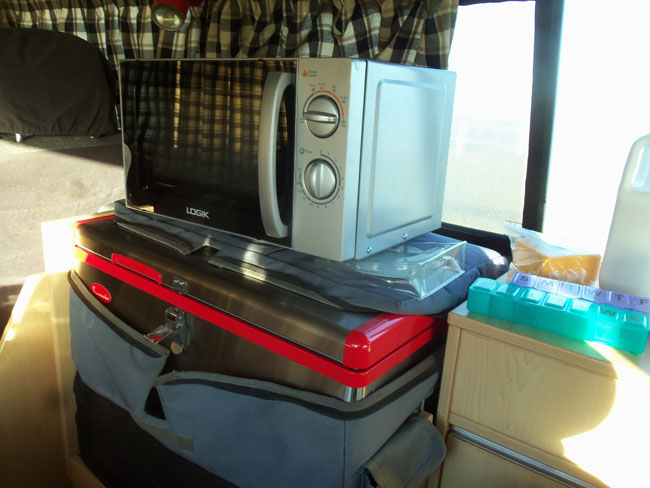 |
The portable toilet Karen found essential (she did not want to deal with beasties by venturing out at night)(and, like everything else, there was even a custom out-of-sight cabinet recess to hide it during the day). Sitting on top of it is the little electric heater which we both felt was the height of decadent camping but it really helped us get out from under the covers on a few below-freezing mornings. |
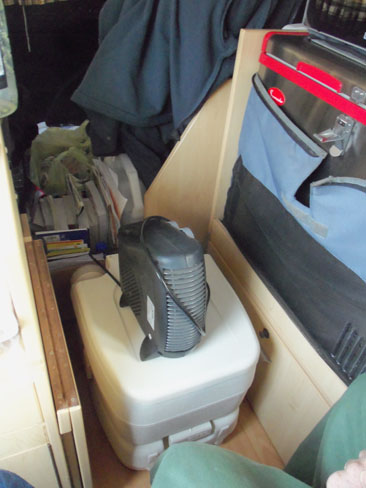 |
Here's our daily shared bowl of morning oatmeal ("porridge")... the primary reason for the microwave oven (along with Karen's morning cup of heated orange juice and Dick's coffee).
We never used the propane stove but it is really well set up for those who like to cook over a flame. The whole stove pivots out through the side door so you can cook outside. There's even a table that hooks on, an awning and two folding chairs. Lekker Camper did a great job on the conversion. |
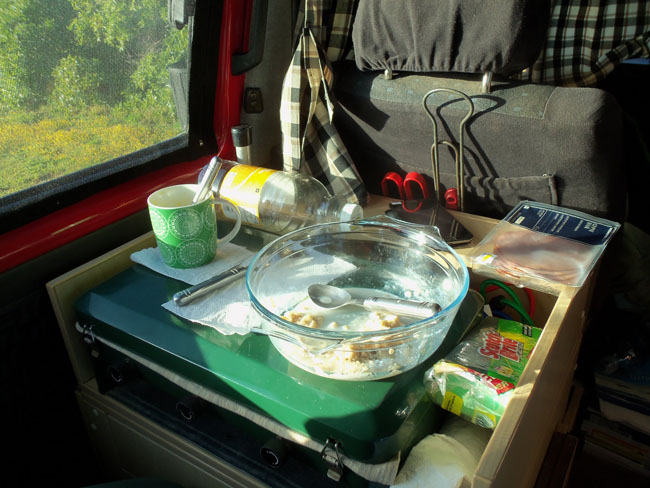 |
| A little further up the road (and after a detour to the seaside town of Yzerfontein) we stopped at the "West Coast Farm Stall" for lunch.
A nursery with an attached resaurant, bird exhibit and some advertised lions in the back. We didn't pay to go stare at the caged cats, but we did admire the walls painted in the theme of "winery". Karen was charmed by the massive thatched roof. |
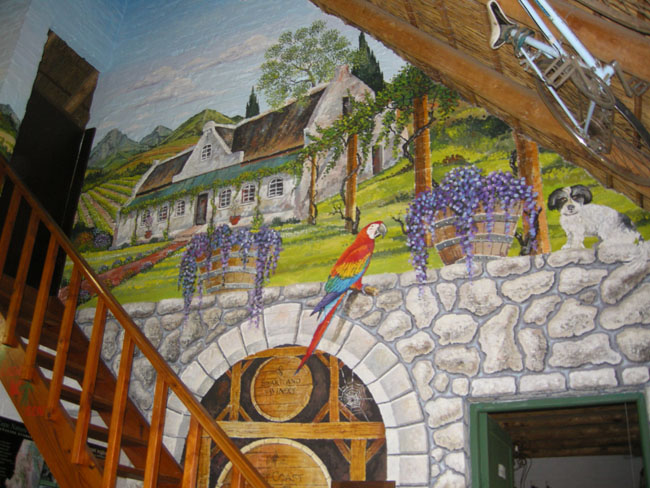 |
| But we did stare at the parrots |
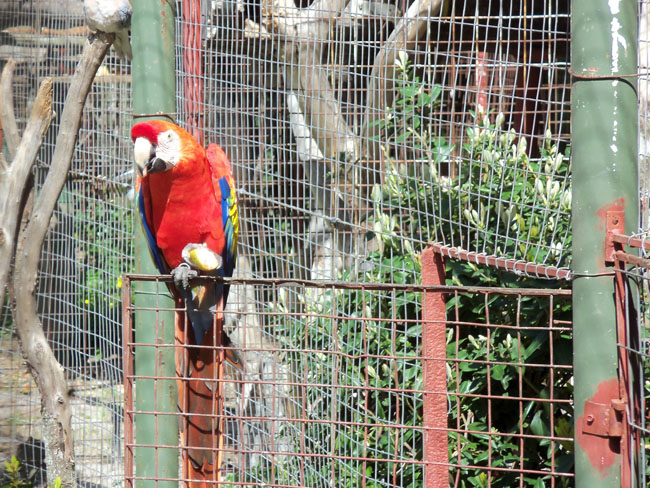 |
| And they stared back. |
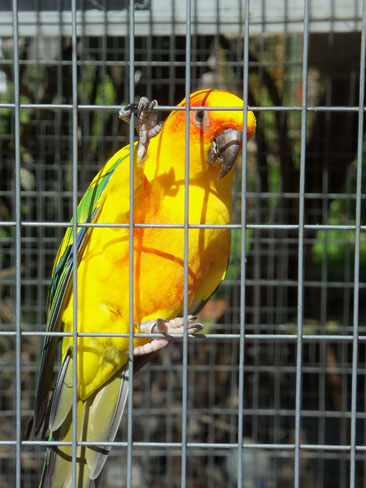 |
| 30 miles up the R27 highway, we again turned west to get back to the shore at the town of Langebaan. The south edge of Langebaan is the northern boundary and entrance to the West Coast National Park. This park surrounds a narrow bay and includes the long peninsula in the distance. |
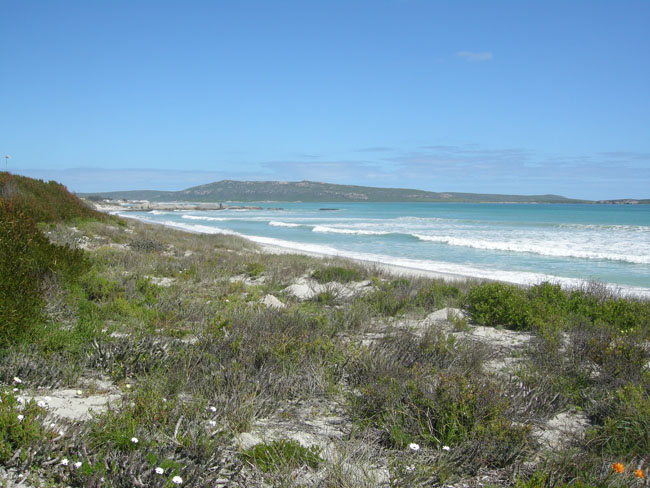 |
| Different flowers this time, |
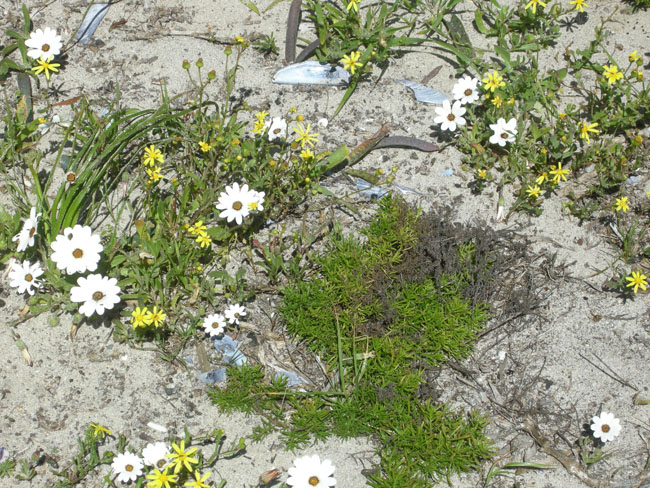 |
| ... fighting for a hold on the wind-swept shore. |
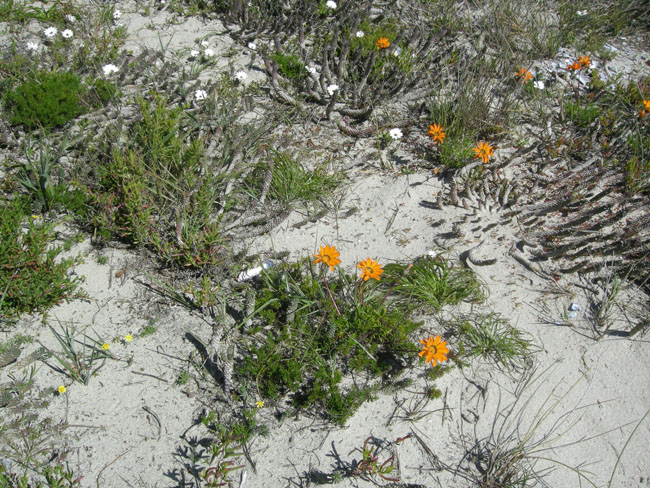 |
| Our Langebaan campsite. Right next to our own patch of flowers. |
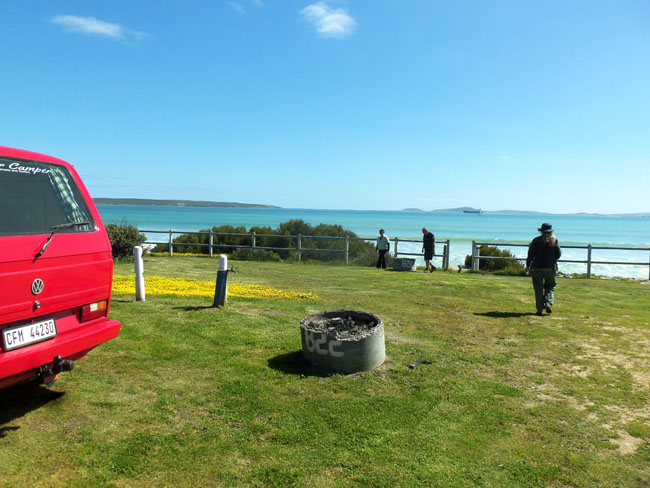 |
| OK -- the gulls thought it was their patch of flowers. |
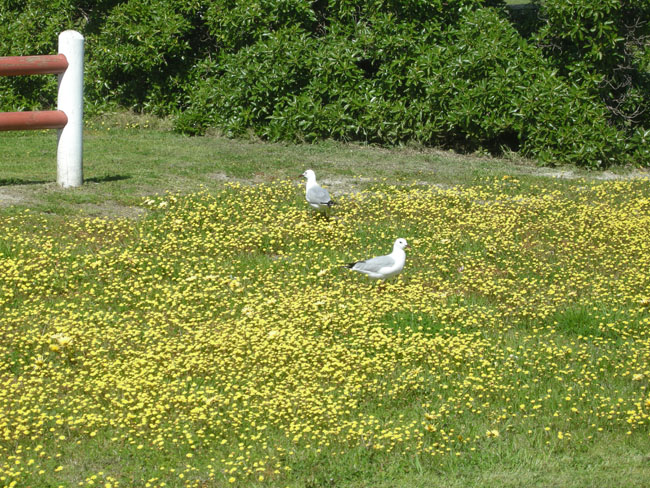 |
Down into the West Coast Park: more flowers.
On this flower-bedecked hill we encountered a crew filming a model running through the flowers. |
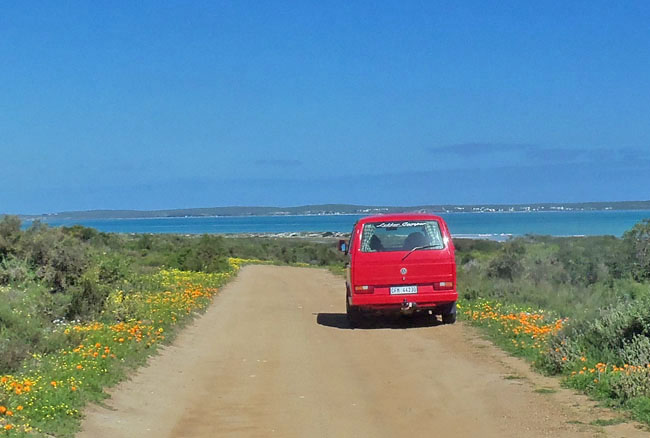 |
| Karen hadn't expected flamingos. This pose always reminds her of the croquet game played by Alice and the Red Queen. |
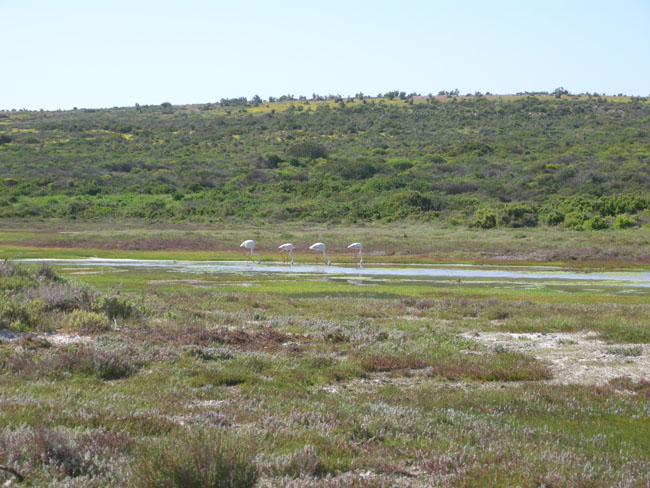 |
| And down to one of the bird blinds incorporated in the park. |
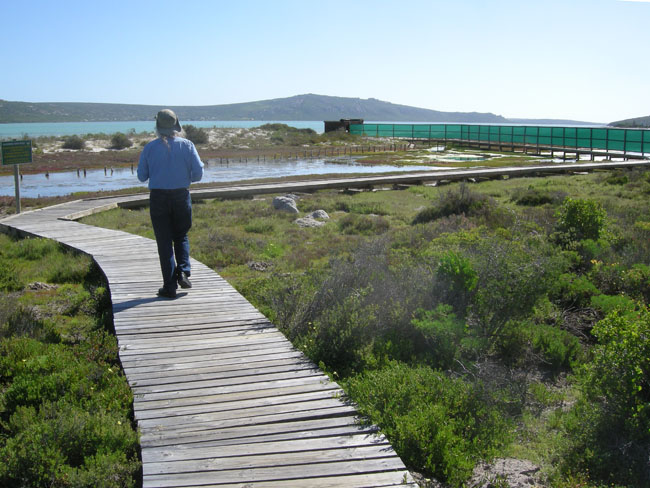 |
| Where we see even more flamingos. |
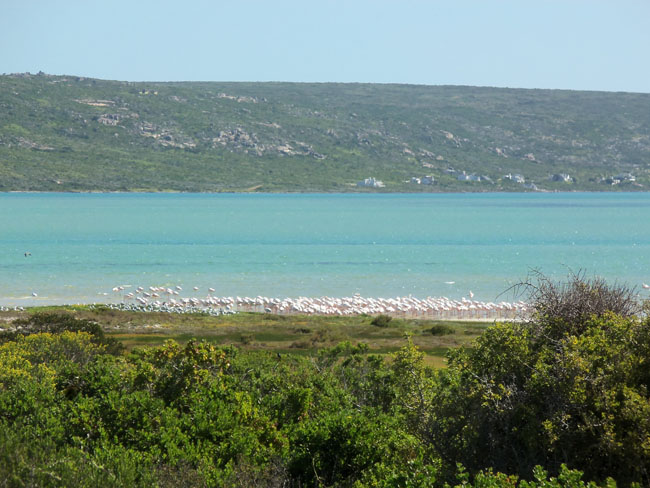 |
| And coming back we find a tortise. |
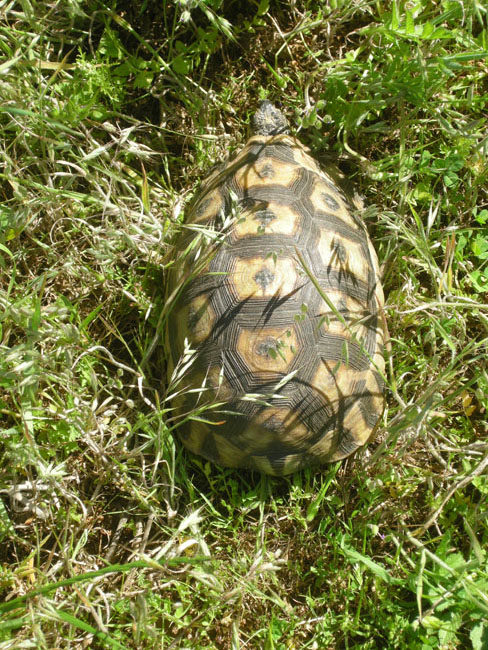 |
| Several small birds were flitting among the kraal thorn bushes. |
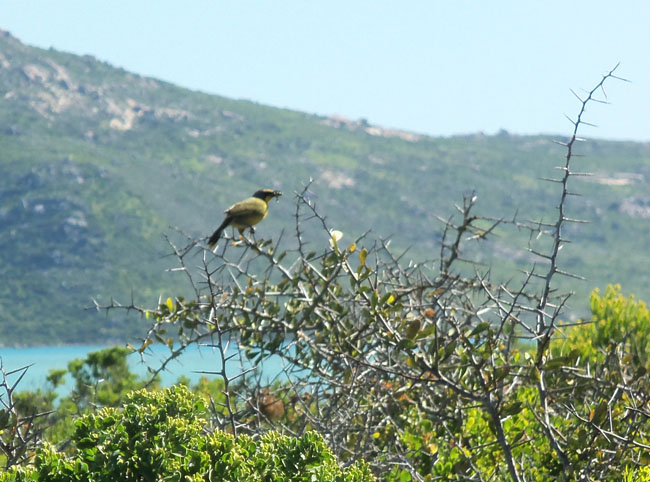 |
| And we meet our first Springboks! |
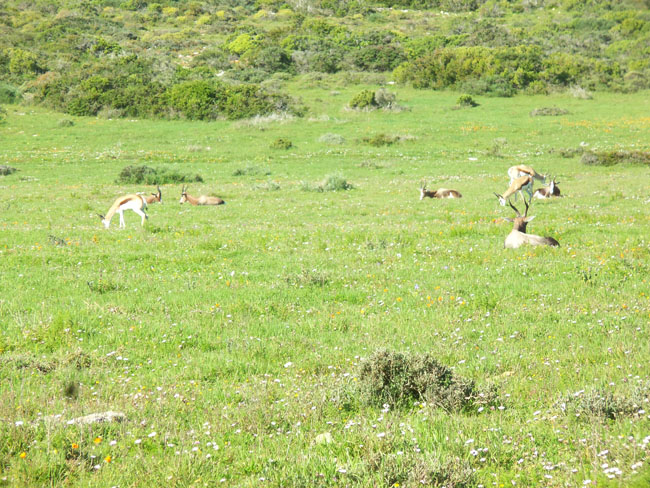 |
| Still in the West Coast Park, we rounded the base of the bay and headed up the peninsula separating it from the Atlantic. This area of the bay is called Langebaan Lagoon, and averages only 3 feet deep. The tip of the peninsula holds Postberg Nature Reserve, which is open for casual visitors only 2 months of the year at flower bloom time. |
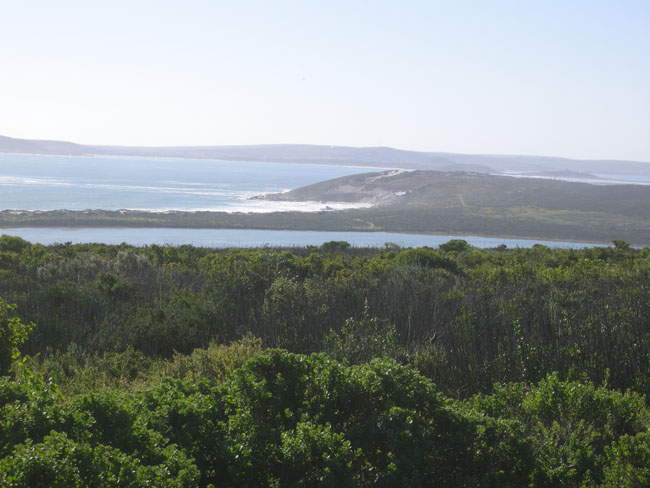 |
| We met Egrets swooping in (or being swooped by) the wind. |
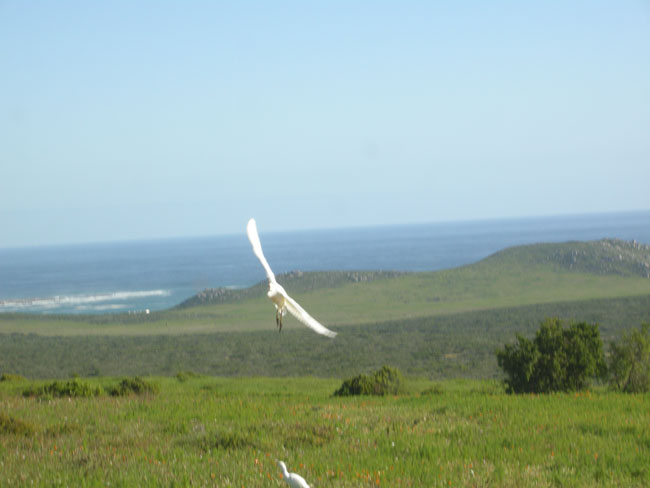 |
| More antelope (they look a little pale to be eland, but that's the closest match in the guidebook). |
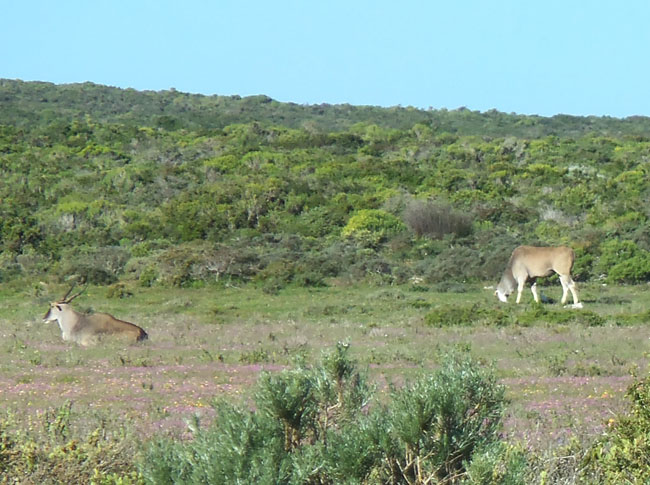 |
| The ever-present ostrich in the (not very busy) park road. |
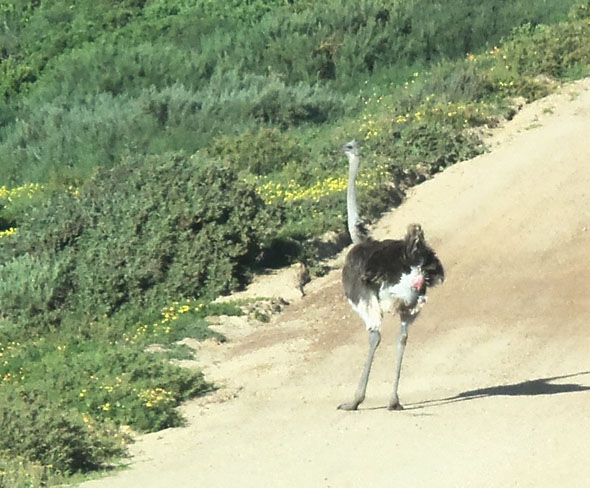 |
| And down to the shore again with amazing surf at the Tsaarsbank picnic area. |
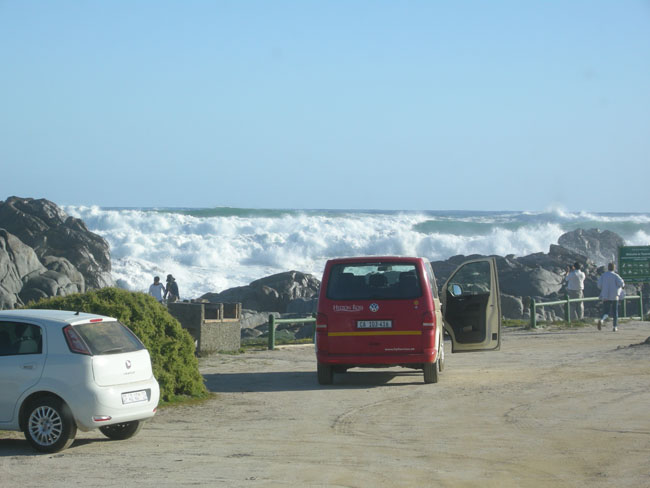 |
|
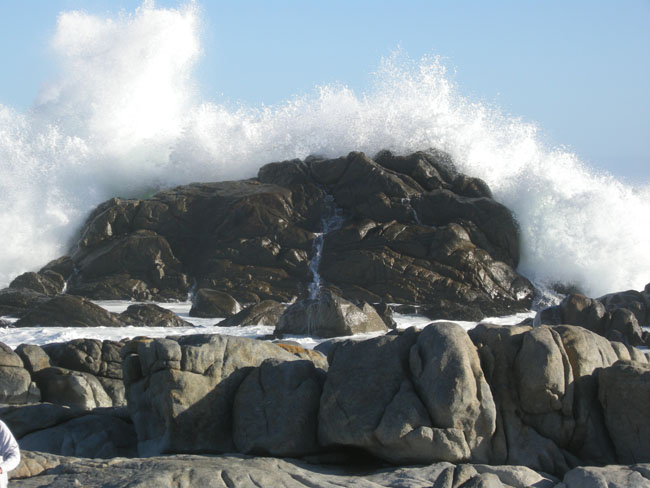 |
| And back to the campground for sunset. |
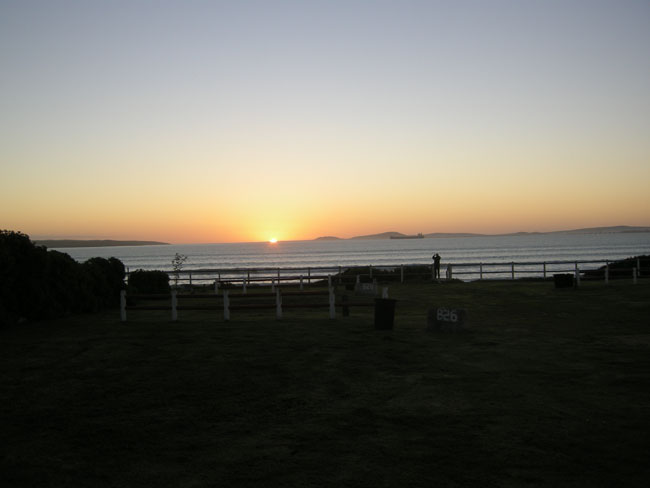 |
| South Africa is embracing wind energy. We saw many trucks hauling parts... such as this 100-foot-plus windmill blade. |
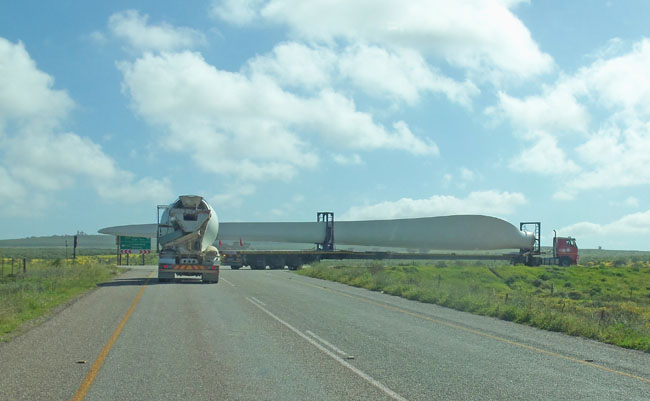 |
| The beaches, parks and scenic spots had comprehensive explanatory signage. |
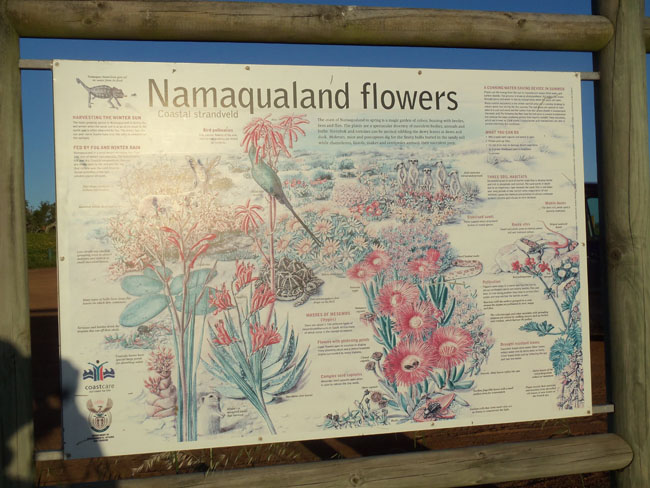 |
| A single group of flowers at a time is exquisite |
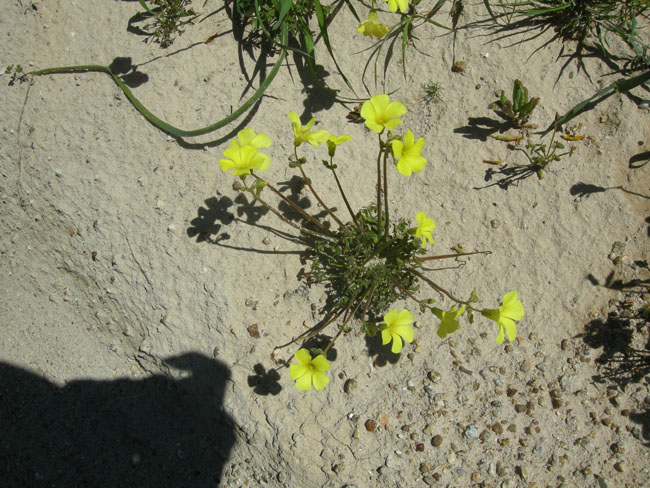 |
| |
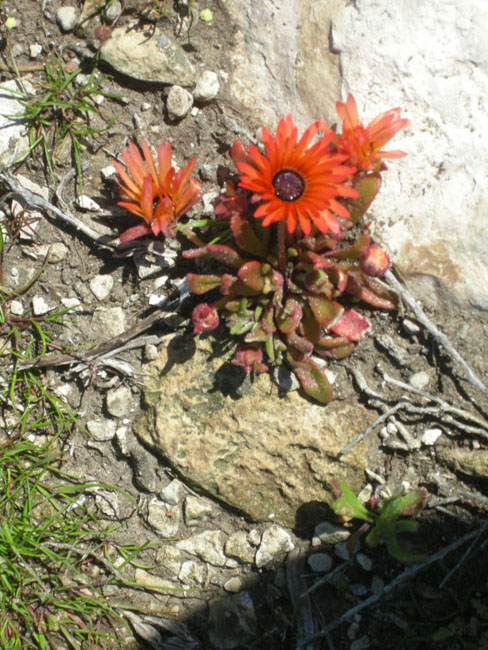 |
| Small groups are very cheerful |
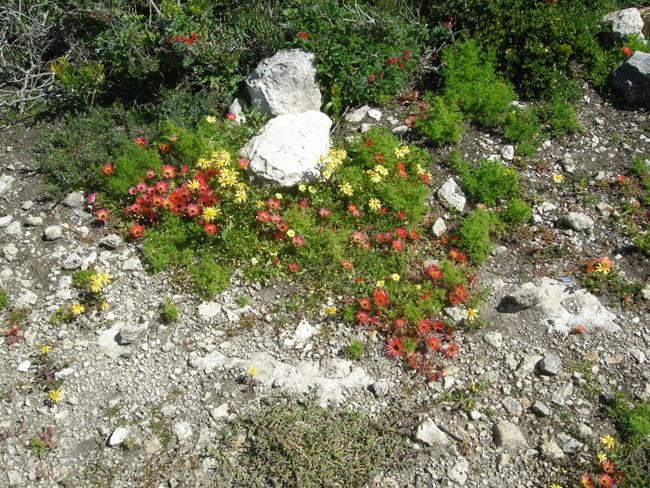 |
| And the fields asounding! |
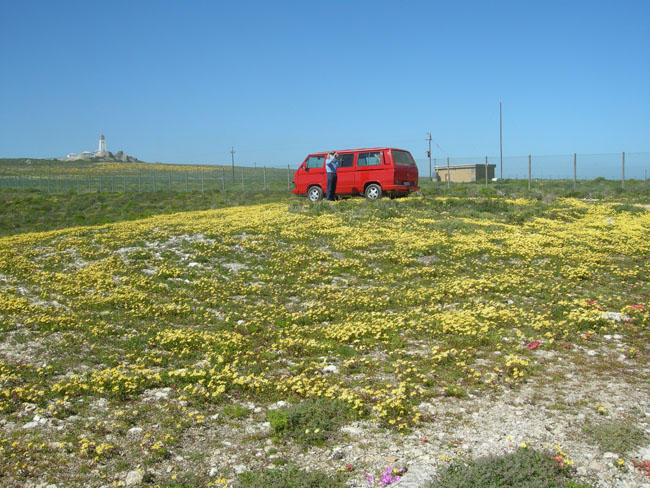 |
| ...these are taken at a small reserve surrounding the Tietiesbaai lighthouse just south of Paternoster. |
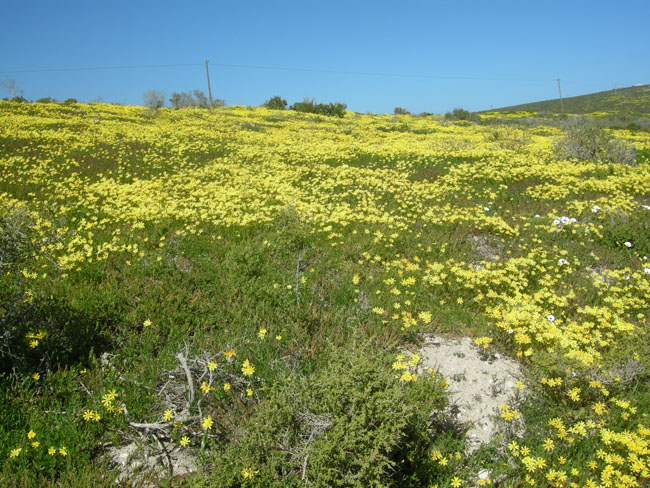 |
| |
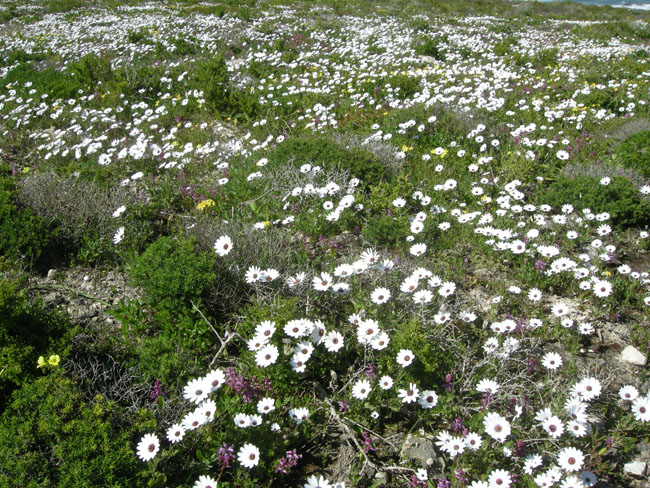 |
| Flowers and surf. |
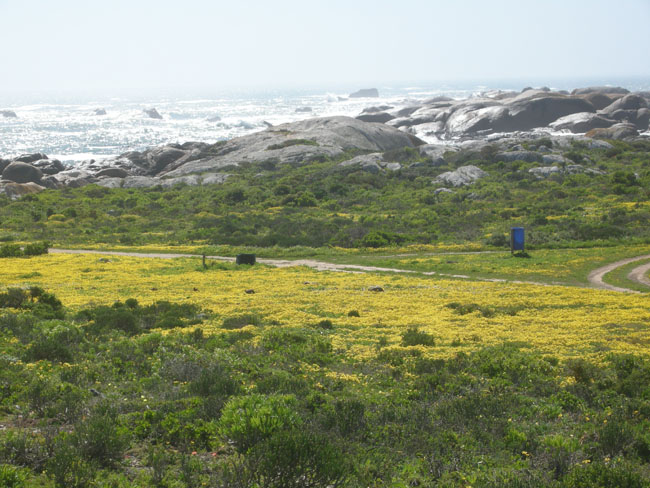 |
| This reserve included a shore-side campground, but we decided to make a little more progress north (since it wasn't even lunchtime yet). |
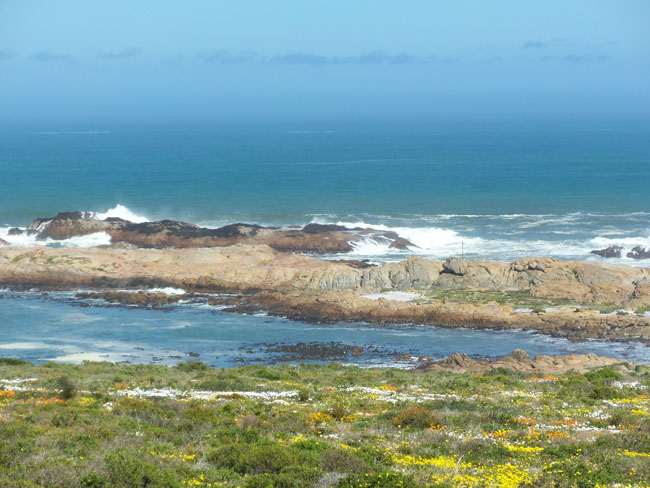 |
| Lunch was in Paternoster, a quaint village of white buildings with a boat fishing just offshore. |
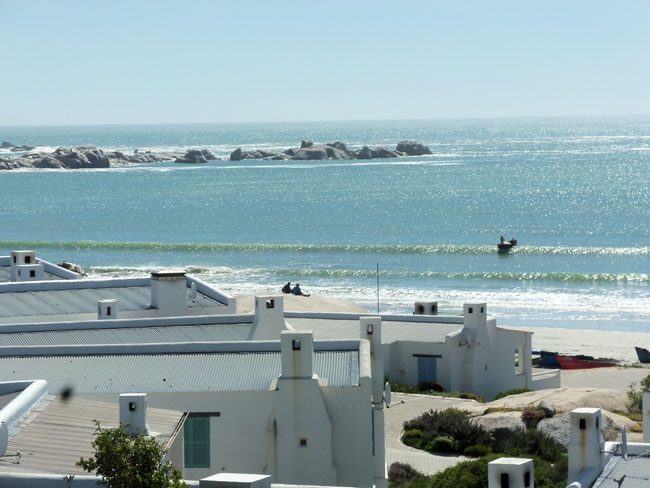 |
We eventually came a bit inland to the N7 highway. Although built for 75 mph traffic, progress was slower than expected due to frequent "stop and go's", chunks of the highway reduced to one-way-at-a-time traffic by construction.
The "hedge" is a citrus orchard, appropriate for the nearby town of Citrusdal. |
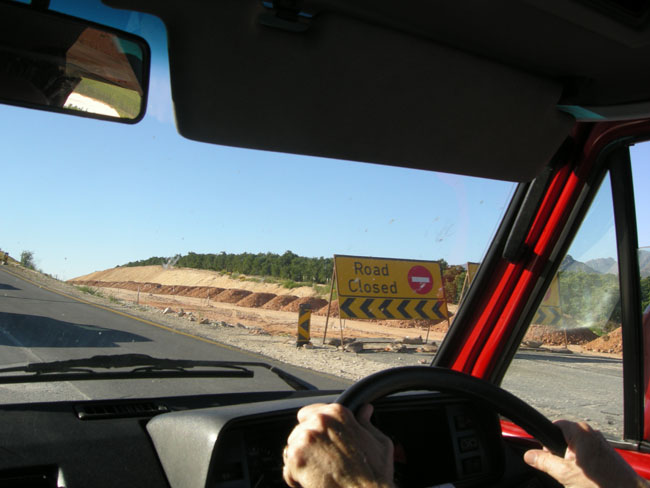 |
| Reaching the town of Clanwilliam fairly close to sunset, we turned off and sought out the campground that was located on the shores of a lake created by a dam. Here we are, snug as bugs and plugged into the power kiosk for the night. Like the majority of our campgrounds, it was extremely pleasant, and not at all crowded... |
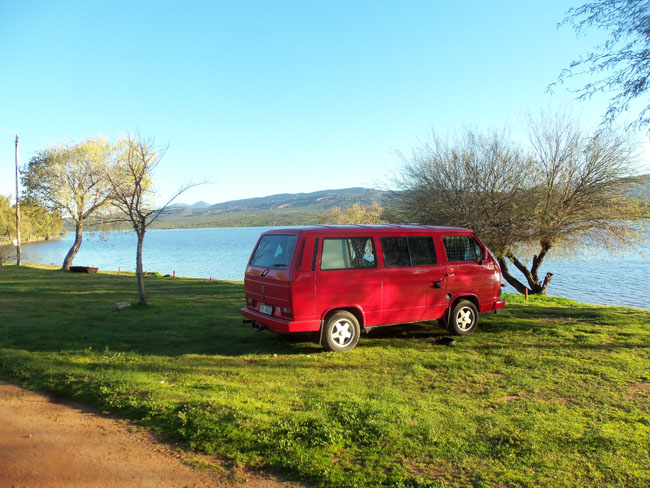 |
| ...if we ignored the flock of tree-dwelling cats. |
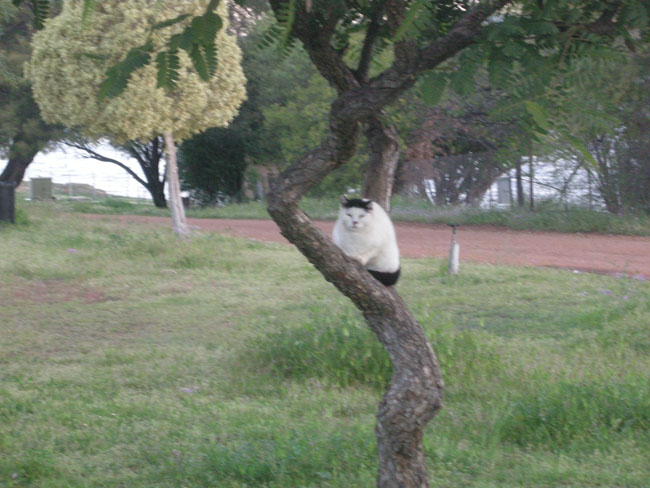 |
| Early evening, looking back over the campground. |
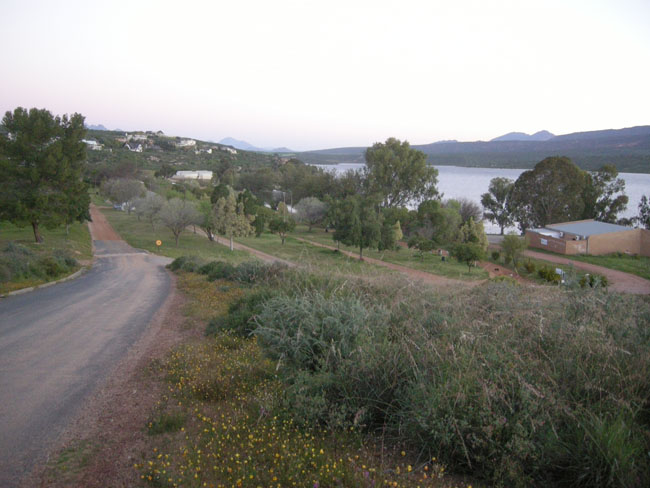 |
| Clanwilliam's principal industry is the processing of rooibos (red bush) tea. Part of the dam's property has been developed as a botanical garden just north of the campground. We spent a pleasant hour or so touring its extensive winding pathways. |
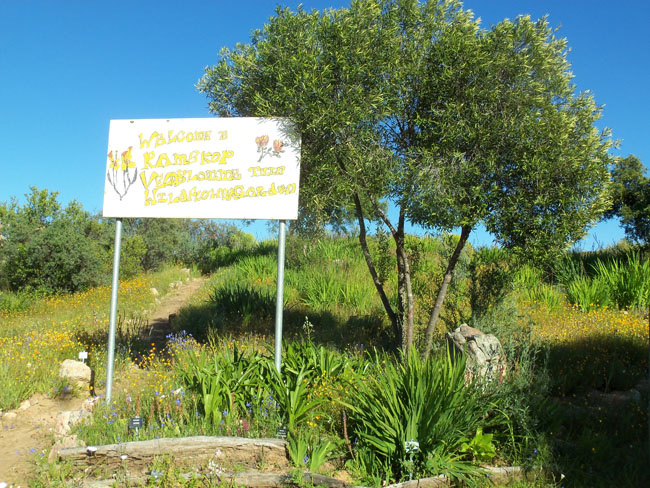 |
| Well marked paths, lots of plants in a more "natural" planting rather then the typical "plant zoo" presentation. |
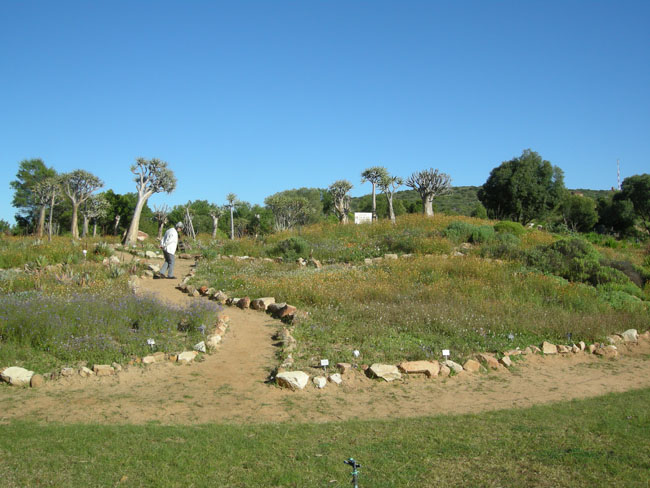 |
| Quiver trees or "kocherboom" (aloe dichotoma) |
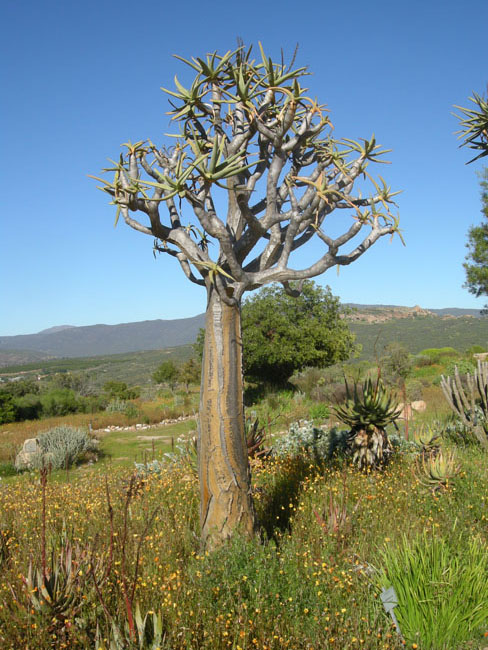 |
| Proteas. In the wild the plant keeps its old seed heads like this until the next fire. In many gardens they are trimed off. |
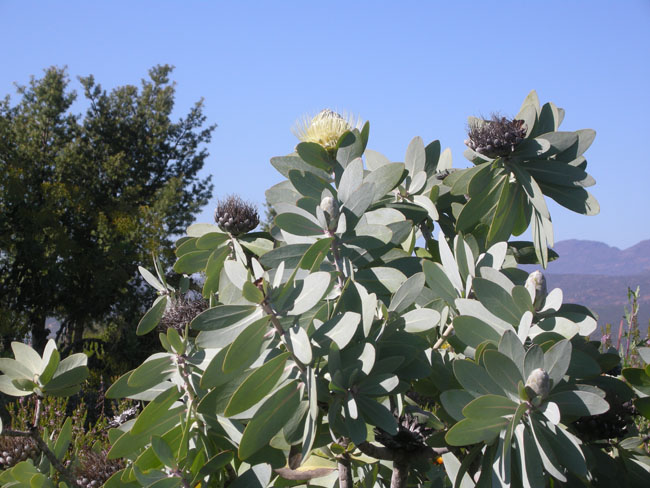 |
| Lots of little flowers |
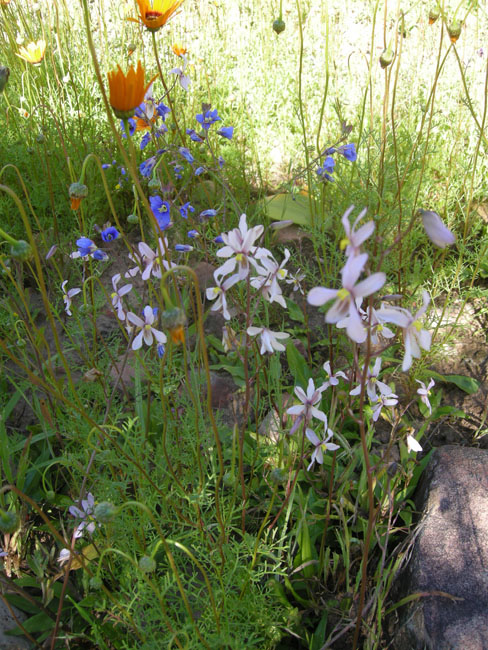 |
| more Proteas |
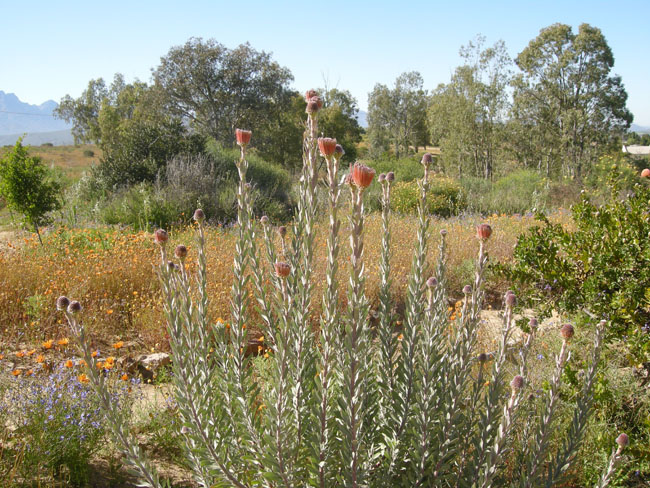 |
| The flat leaves of an amaryllis relative that blooms in March (Autumn in South Africa). |
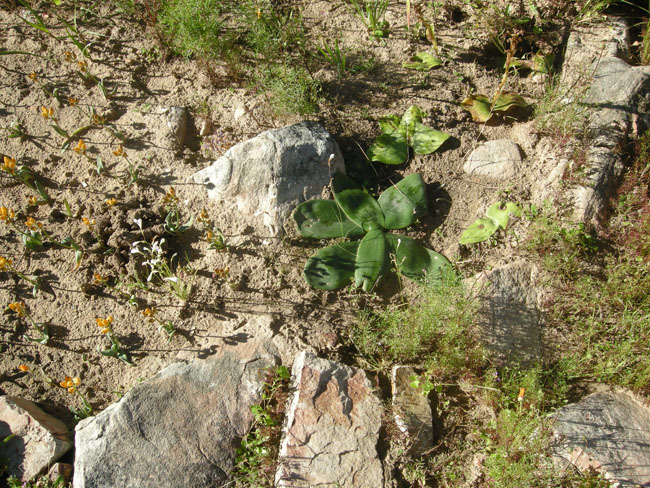 |
| Flowers, shrubs and scenery... |
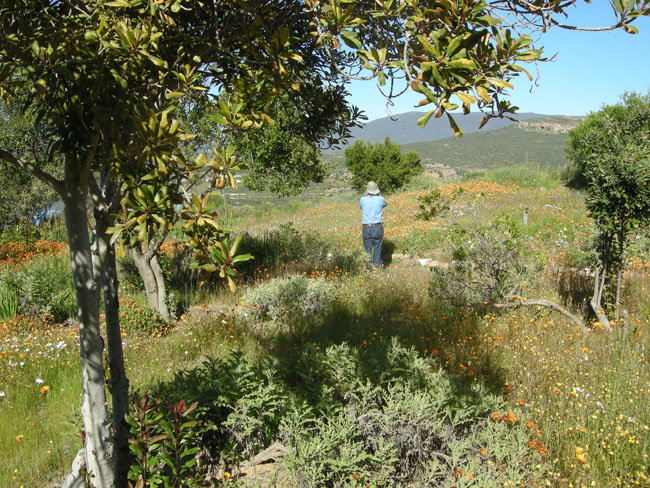 |
| ...and tourists (with citrus orchards in the distance). |
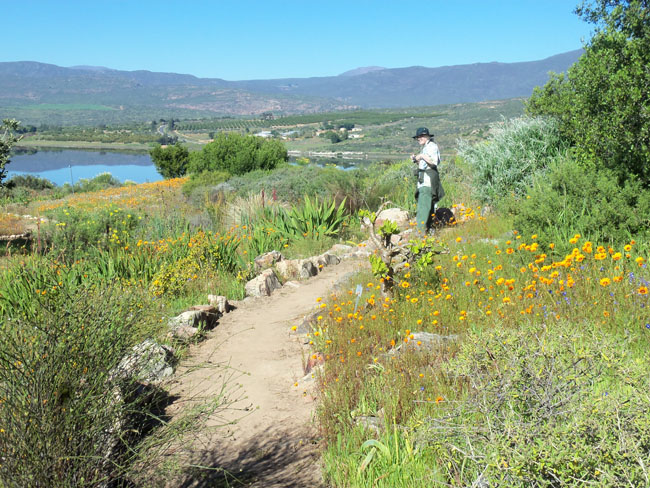 |
| We stopped in town to see their "Wildflower Festival". The local botanical society had transformed a church into a flower display. |
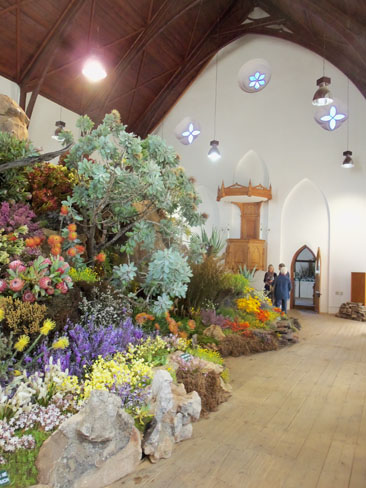 |
| All of these flowers were collected from the surrounding region within a week of the display being set up. I think it was up for about 2 weeks. |
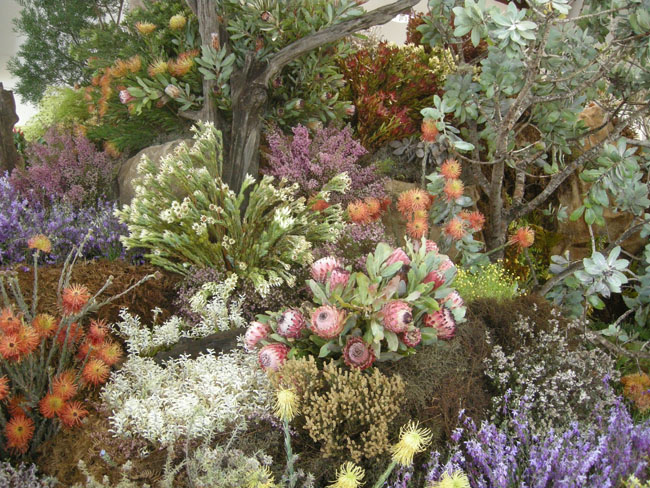 |
| |
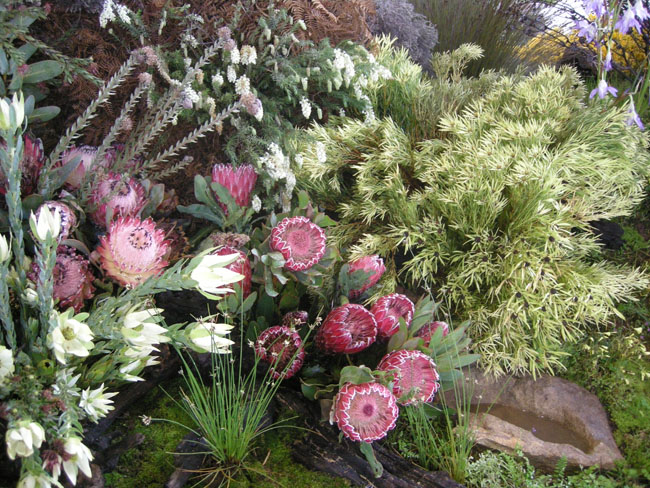 |
The room behind the altar was filled with labeled examples of the flowers in the main display.
Over half of the flowers were Proteas like these. |
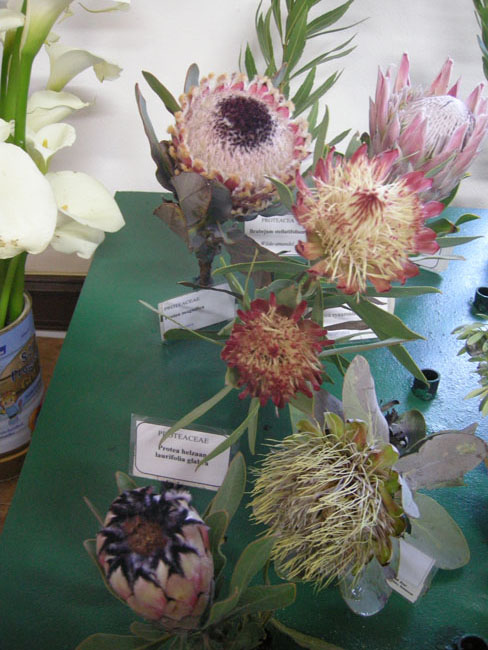 |
| and these |
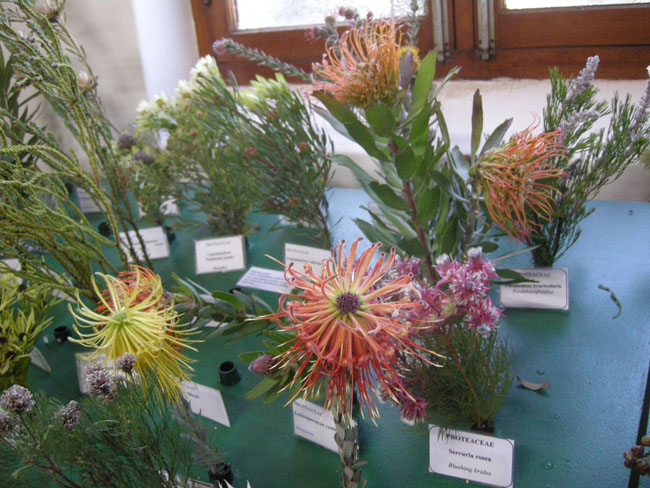 |
| My second favorite protea -- I never saw it in the wild. |
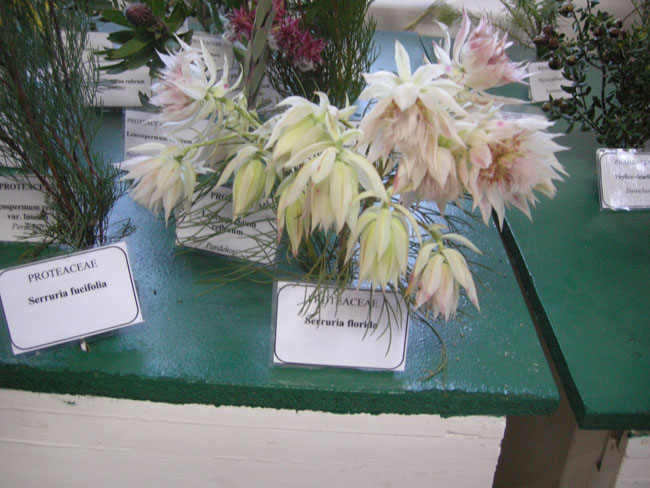 |
And then they went all out and covered parts of the architecture.
The sharp-eyed among you may notice the red button in the center of the display. Despite the power cords on the floor, nothing happened when it was pushed. |
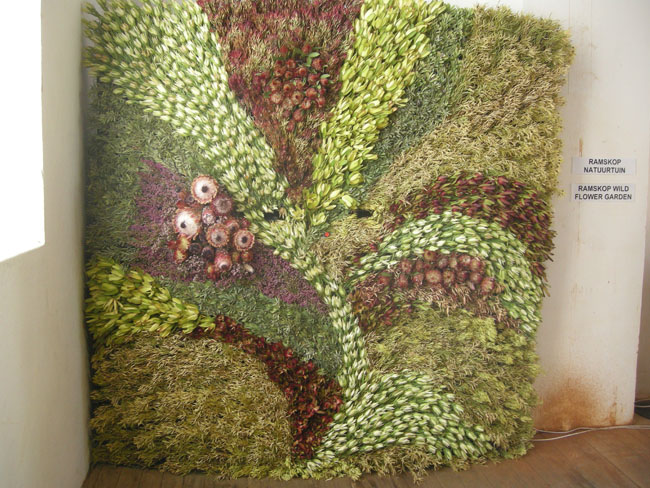 |
| 50 miles further north lay the town of Vanrhynsdorp. They have a famous nursery, named for the Kocherboom tree. |
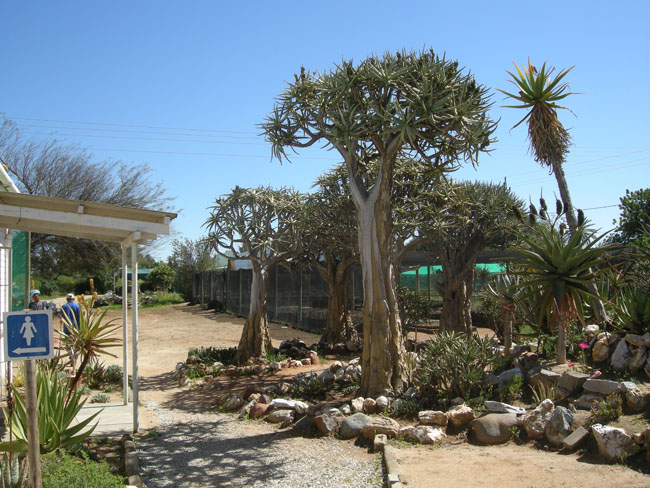 |
| ...of which they had many. |
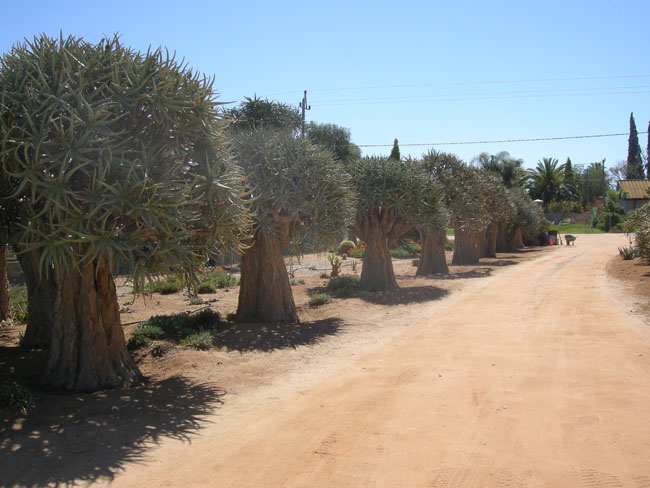 |
| Out into the Flower-bedecked wilds again. |
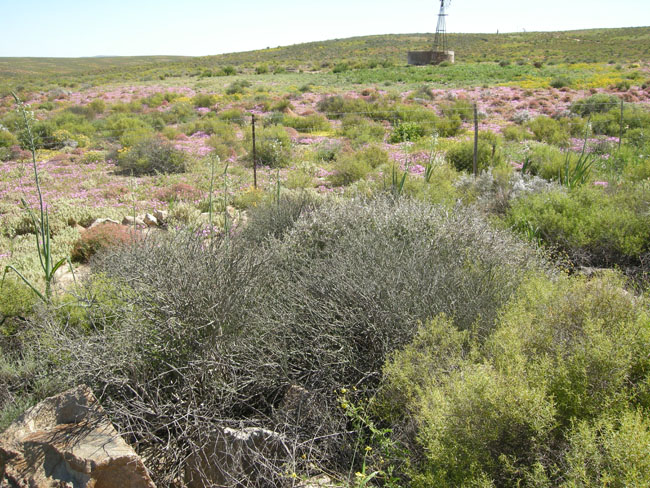 |
| And more stop and go's |
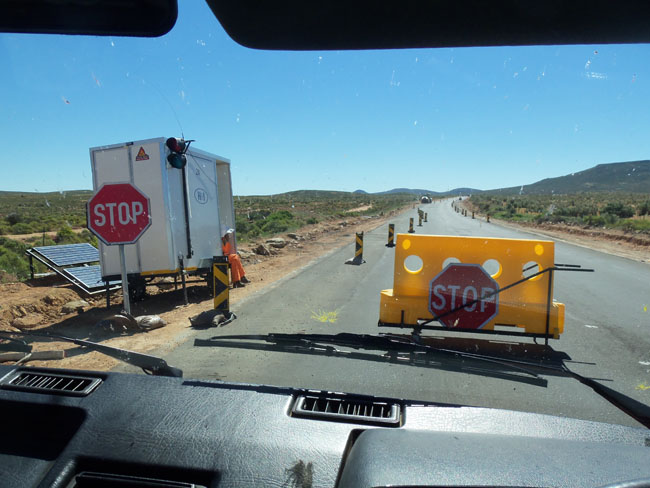 |
| Rest stops like this are found along all the major roads. Depending on where you are the sign has a tent like this or a tree. There is always a table, seats and some sort of shade. Most of the people on the road seem to be male and they probably don't see anything missing. |
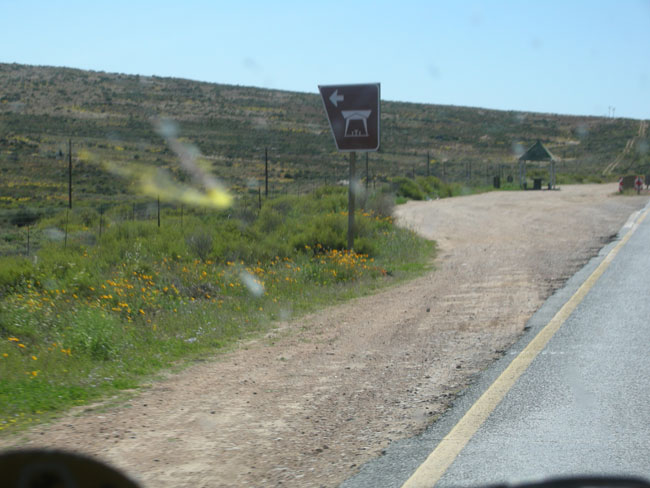 |
| On into the town of Kamiskroon, named for its nearby signature mountain formation |
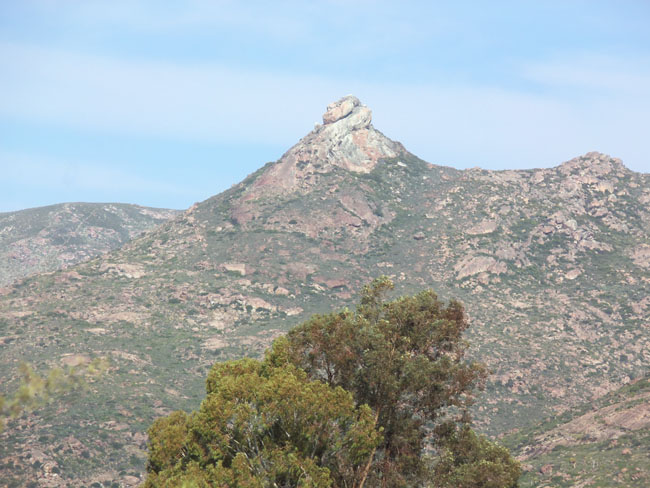 |
| Our next campground. With "invasive aliens" from the American southwest (the Agave, not the contents of the VW). |
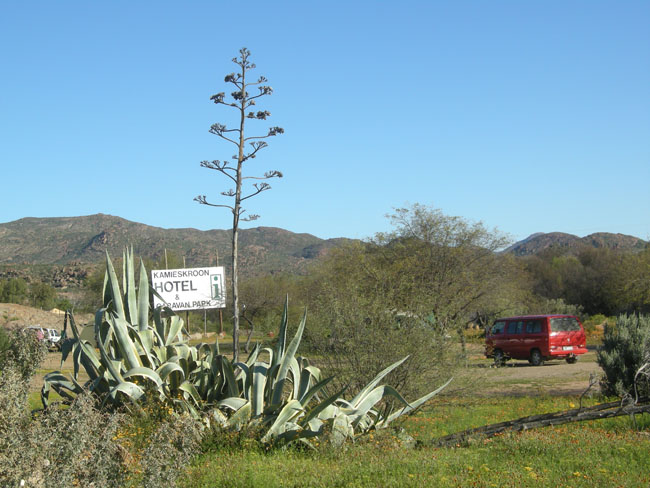 |
| As a converted lot behind the only hotel in a very small and dusty town, this appeared to be a fairly frill-free campground (with power). |
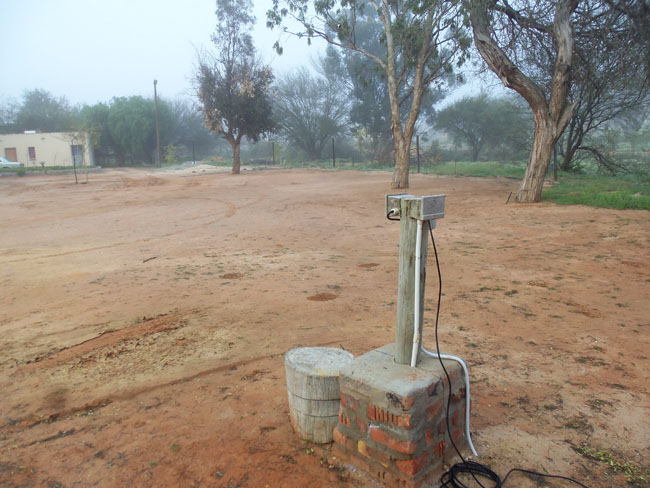 |
| Despite the barrenness of the actual campground there were still flowers. |
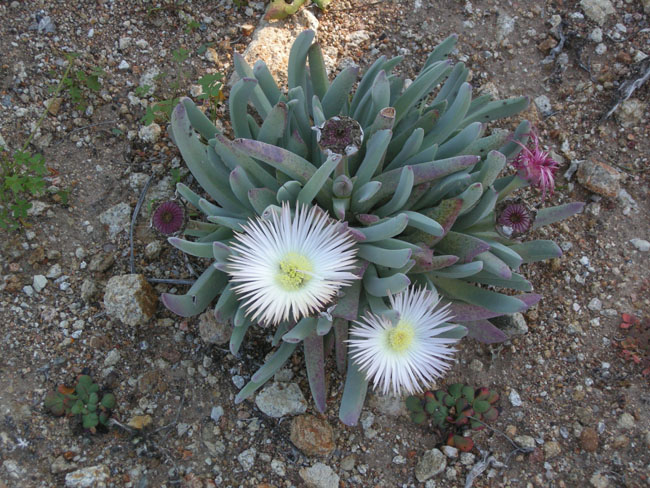 |
| Karen finally got a photo of the local "pied crow". They all seem to be wearing evening dress. She wonders if they got the idea from the penguins? |
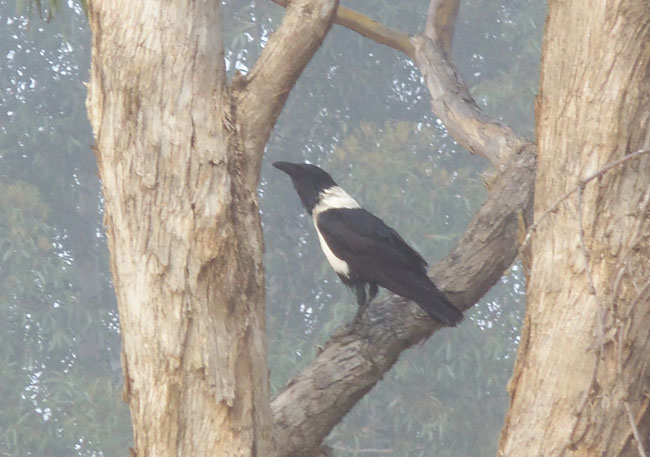 |
| On our way out to the next flower reserve we passed another campsite. This is the sort of vehicle used to make "cross Africa" or "London to Capetown" expeditions. |
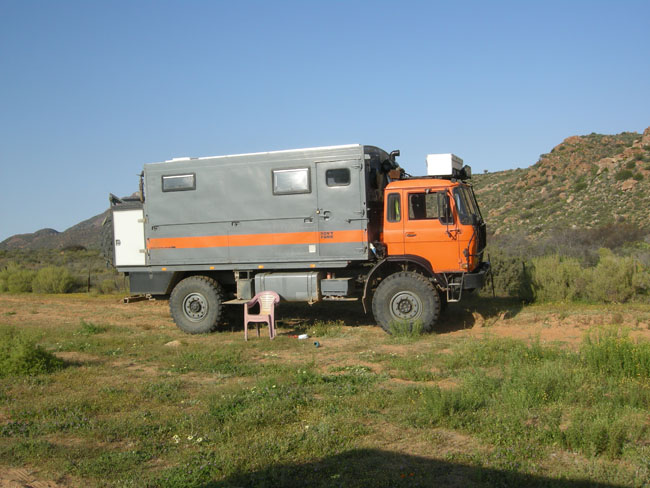 |
| A gravel road led westward from Kamiskroon into the hills. |
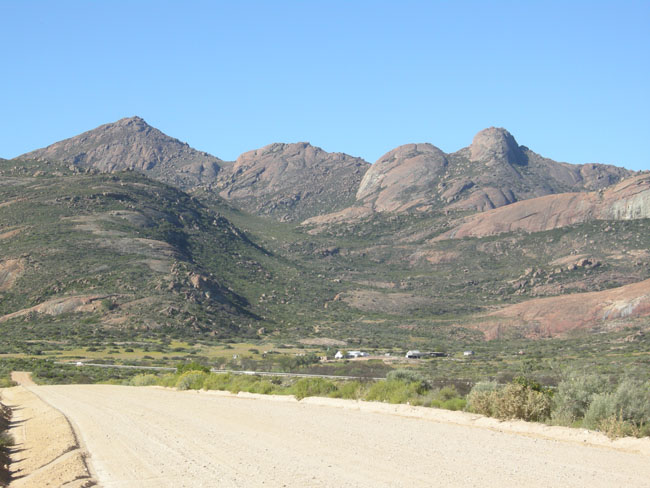 |
We eventually crested a mild ridge and saw flowers for miles.
This was the beginning of the Namaqualand National Park. |
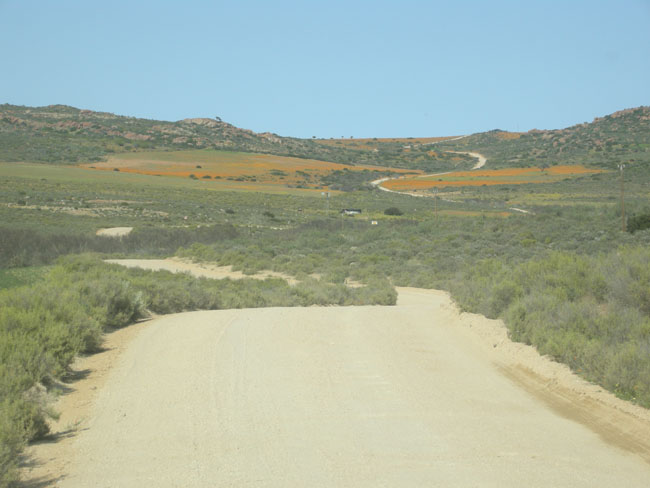 |
| "Padstahls" (farm stalls in Africaans, the birth language of most of the people in this area), found year-round along the tarred roads, also open along the dirt roads in the flower season to feed the tourists. "Kos" is Africaans for "food", "Lekkergoed" is candy. |
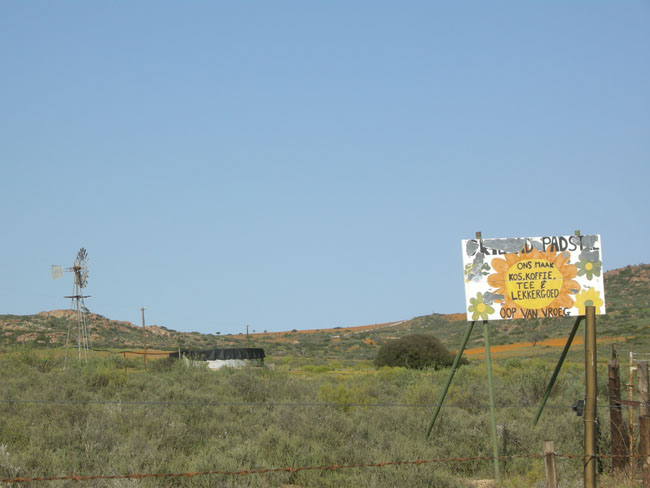 |
| The park had acres of flowers, similar to the desert blooms of the American southwest but more profuse than what I've seen there. |
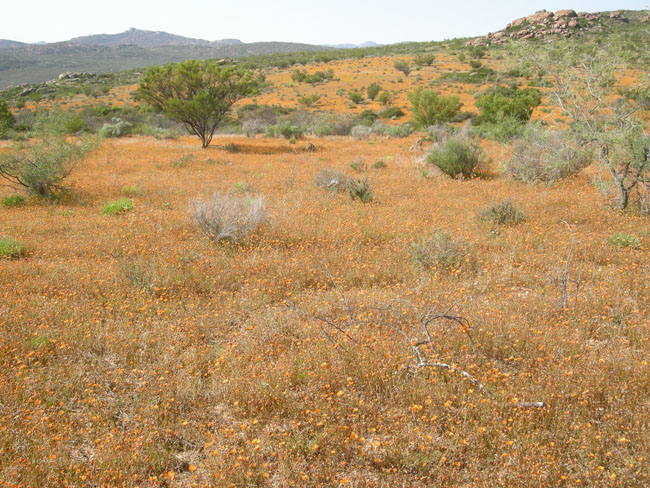 |
| Many of the flowers follow the sun. This is taken with our back to the sun (into the face of the flowers). The color is much more vibrant than the photo above which is at about right angle to the sun (sideways to the flower heads). |
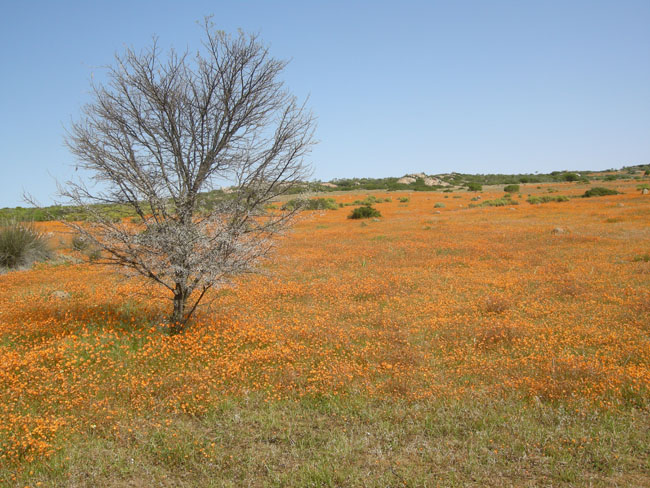 |
| Many flower reserves are farms purchased and returned to a more "natural" state. Often this includes leaving windmills and repurposing the buildings. |
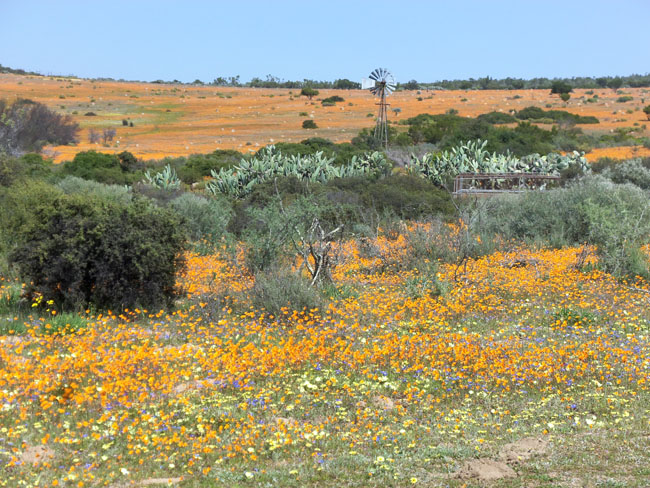 |
| Close up the variety becomes apparent. |
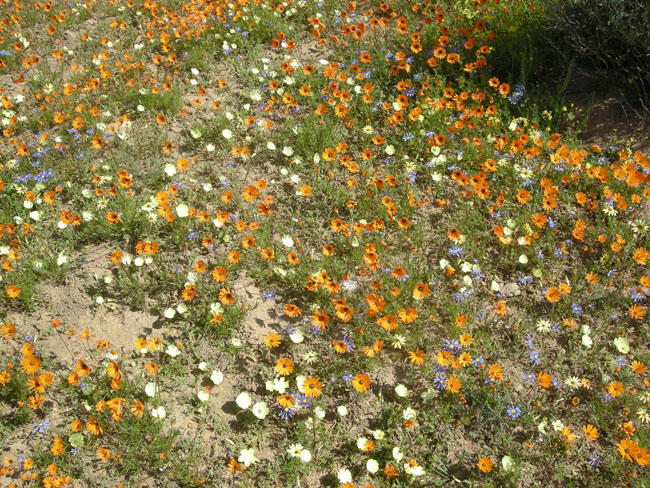 |
| Even closer you see the size variation. I'm going to try this as a glass table top. |
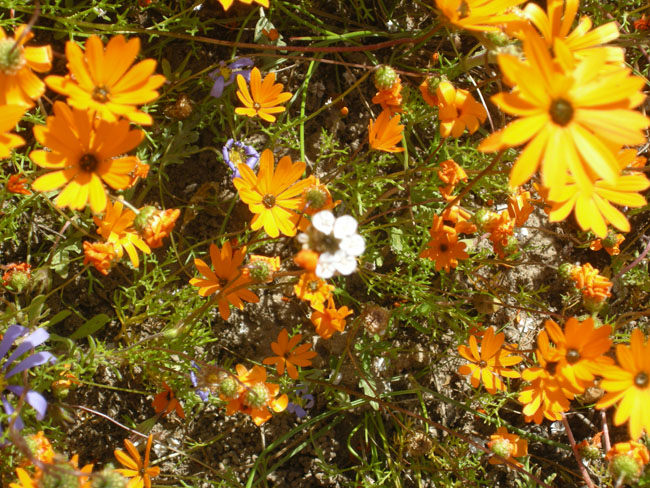 |
| |
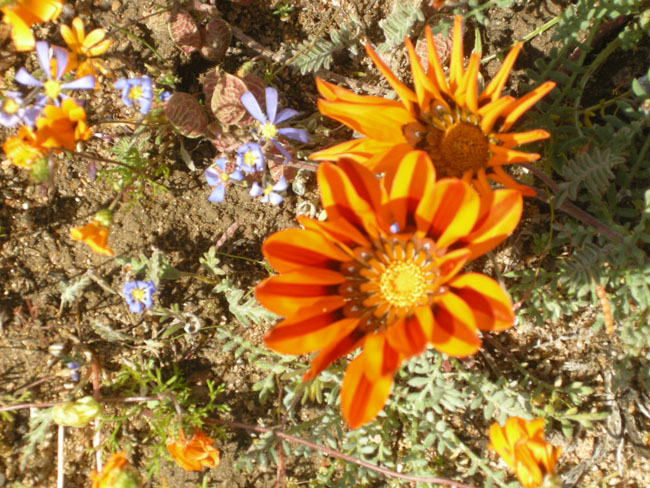 |
| |
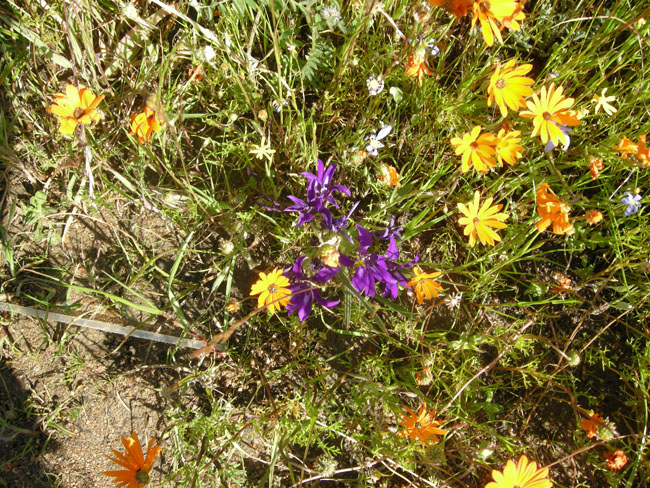 |
| |
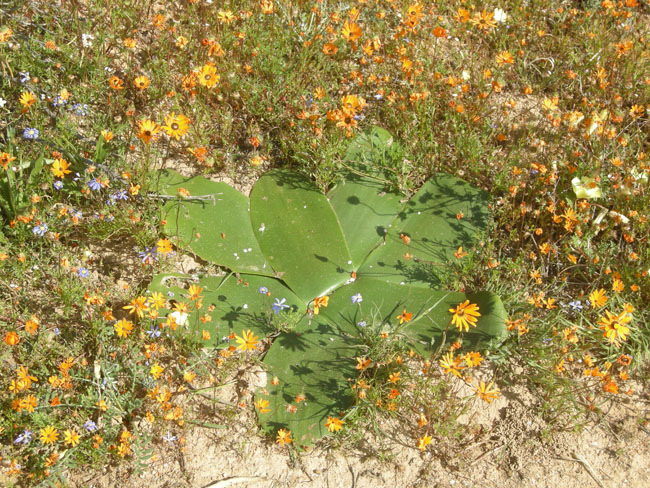 |
| Yes, a wild geranium! Many species of geranium (or more properly pelargonium) come from South Africa. |
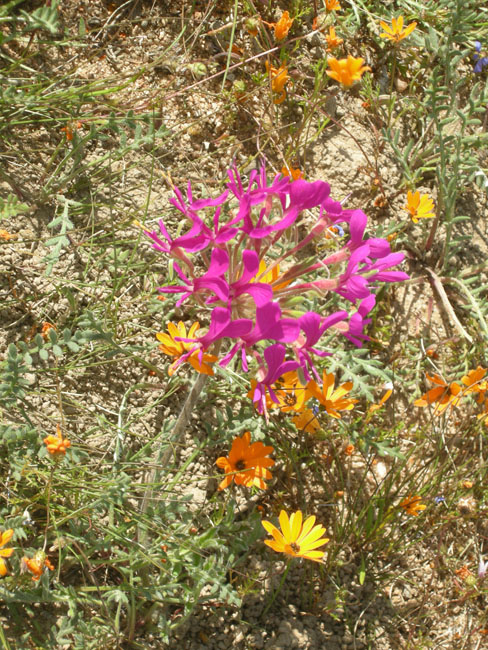 |
The park had a circular road for touring the most floral area, and walking paths criss-crossing the area for those of us wishing a closer look.
The pale lumps behind Dick are not rocks... |
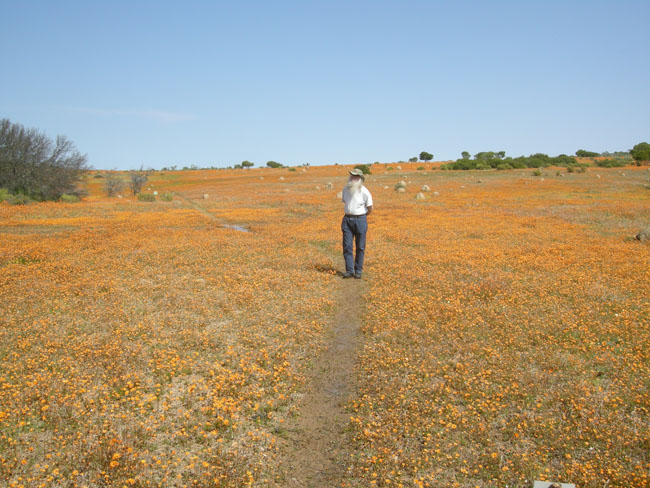 |
| ...but termite mounds. |
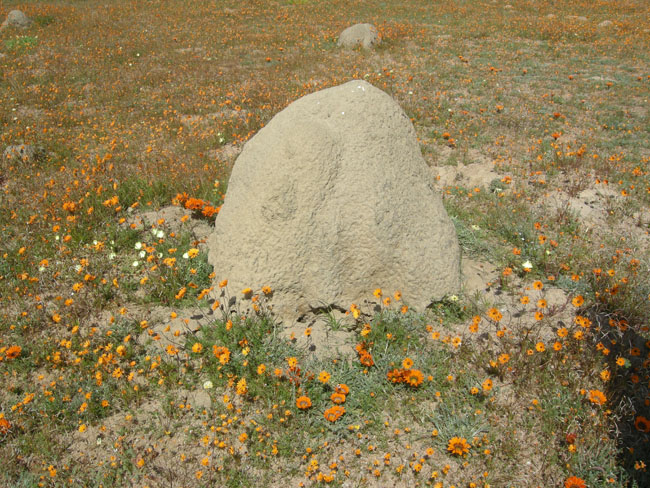 |
| We didn't see the termites but we did see lizards which we presume eat the termites or other insects in the flower fields |
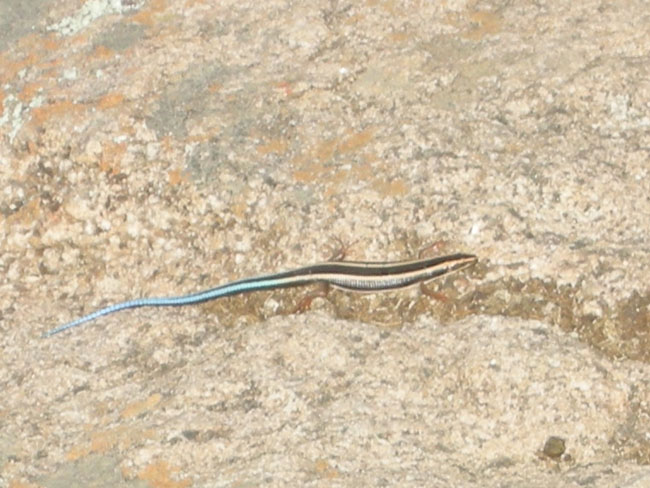 |
| And another |
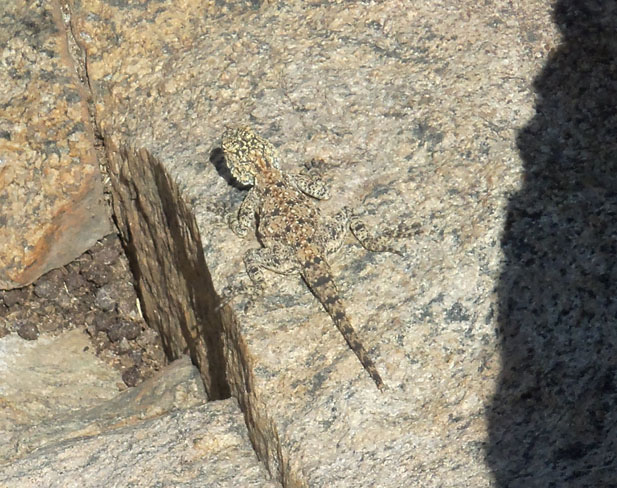 |
| Springbok watching us. |
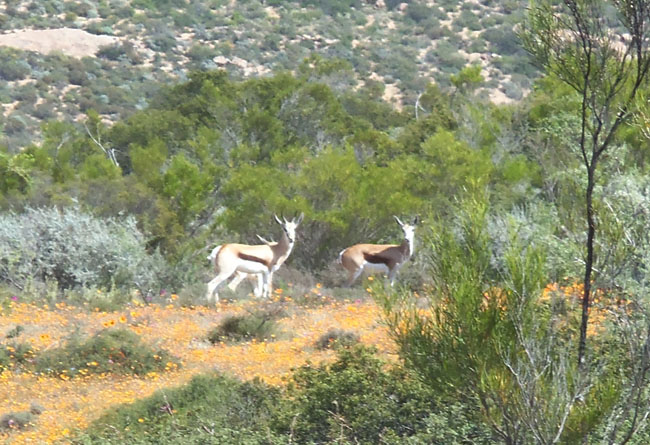 |
Karen having lunch and watching the flowers.
Shortly after taking this shot, we spotted Springboks in the distant field of flowers. |
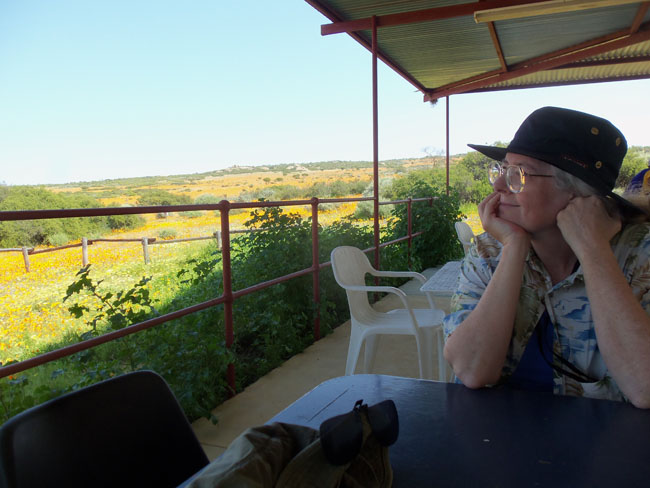 |
| They really don't want you going that way! |
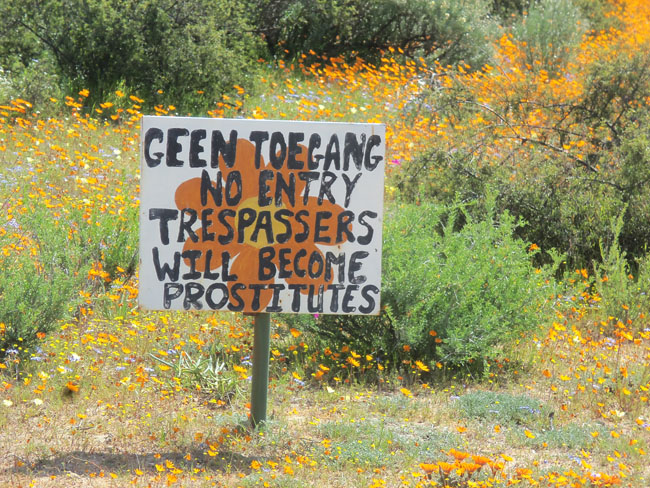 |
Lacking a 4-wheel-drive vehicle, we couldn't take the road that ran through the park to the sea.
Even so, turning back towards camp, there are still flowers. |
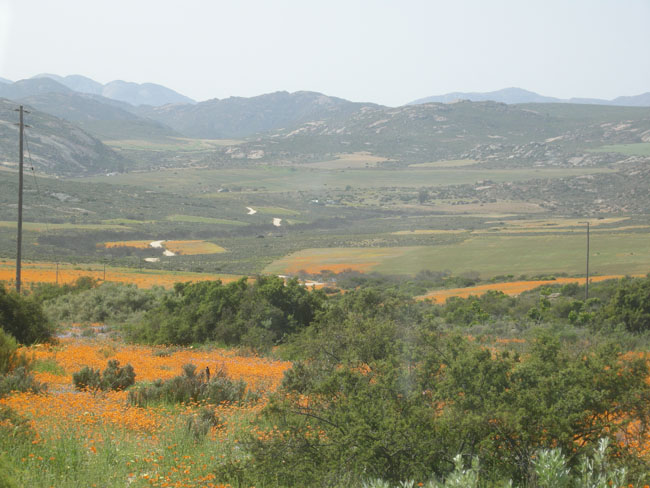 |
| And another padstahl (listed in some of our guidebooks as a restaurant). |
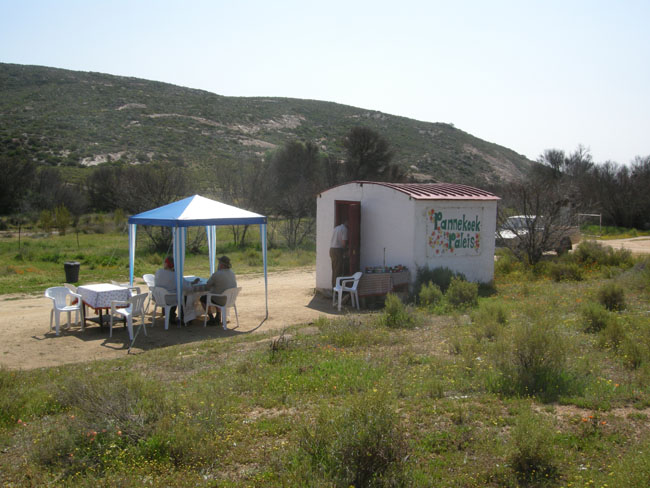 |
| It doesn't look it, but the building on the right had roadside advertising as a restaurant. |
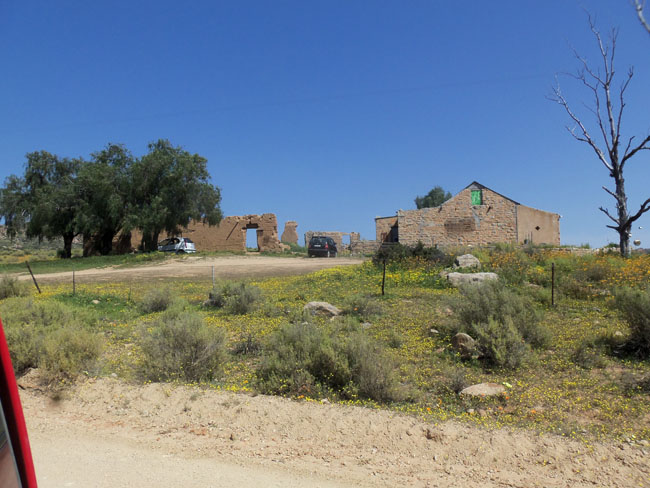 |
| We're still in the very early spring. Recent rainfall has raised several streams to fill the fords crossing the road. Some had paving, most were simply wet. |
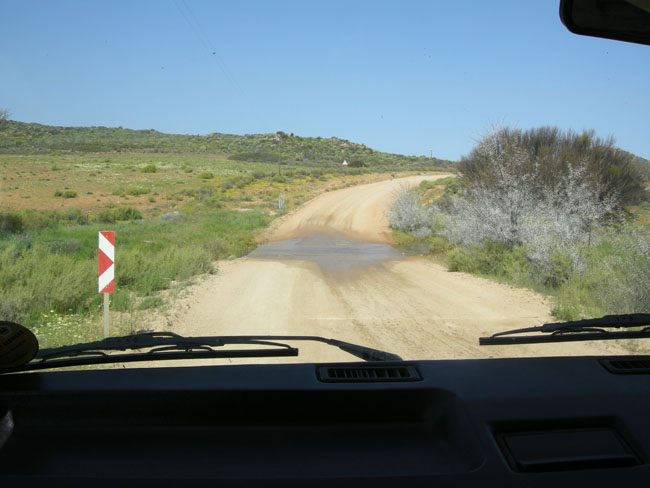 |
| Back to Kamiskroon for the night |
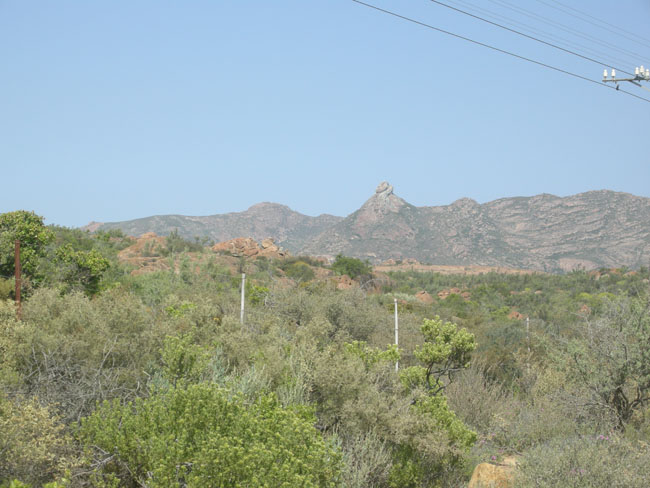 |
| Almost every small town has a church in the center of town, this is Kamiskroon's. Most are photogenic. All are very different. |
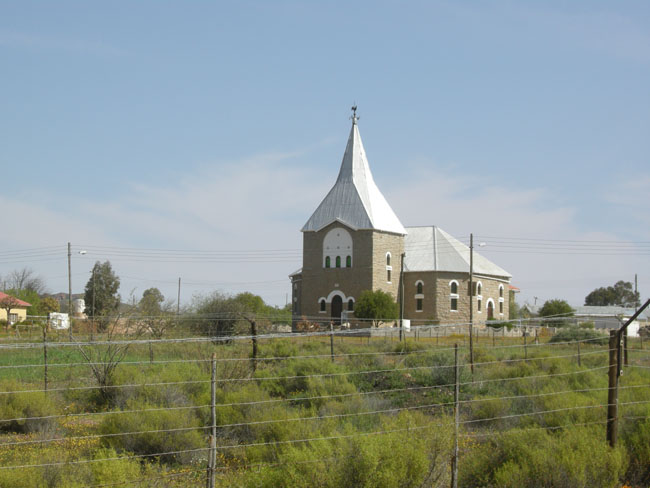 |
| The next morning we set off back south before the fog had lifted. |
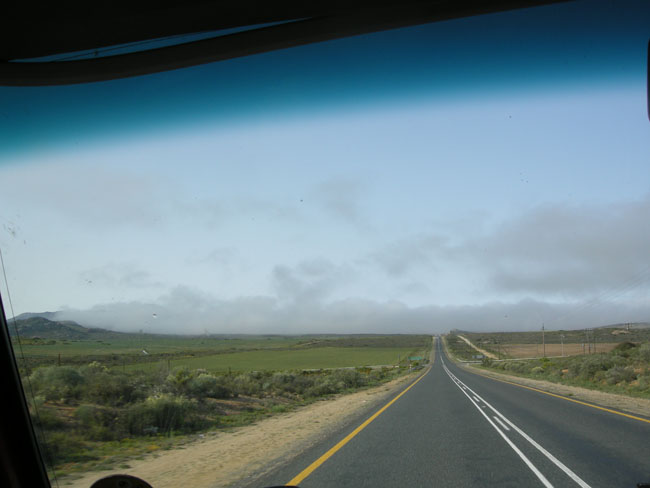 |
| After stopping in Vanrhynsdorp (again) for lunch and fuel, we turned inland on a new road. As we climbed up onto the Bokkeveld Plateau, we could see the rivers headed west to the sea. |
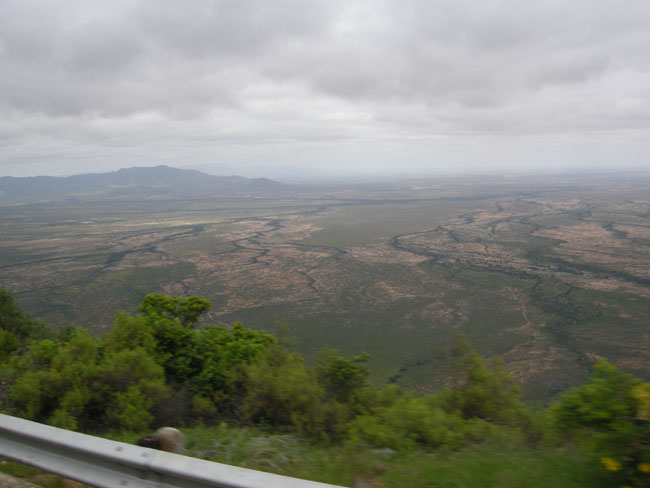 |
| Atop the plateau, we visited the small town of Nieuwoudtville. Although the town was small, the church was impressive behind its lawn of lavender-colored flowers and with its walls of Tafelberg sandstone. |
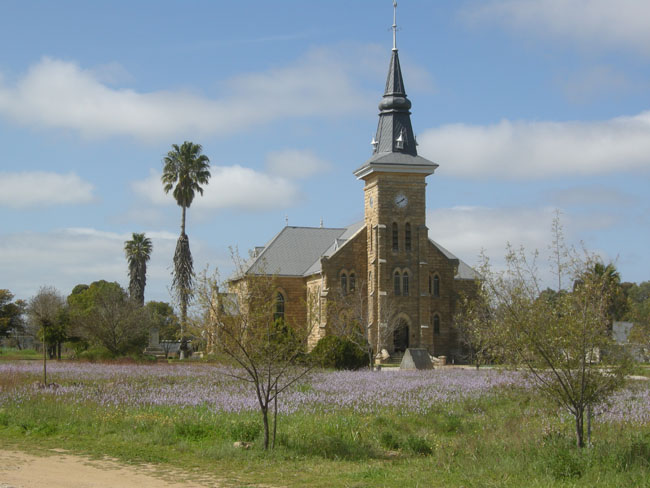 |
| Just south of Nieuwoudtville is the Hantam National Botanical Garden ... another returned-to-nature ex-farm. Acres of flowers with miles of walking paths ... and blue cranes. |
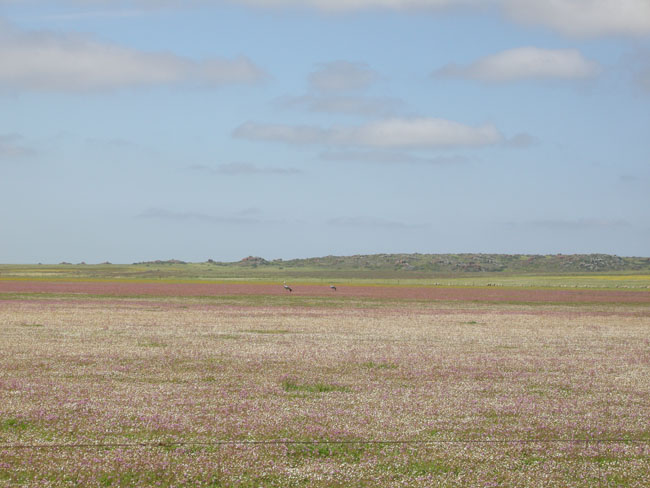 |
| The paths led through areas of ever-so-slightly differing elevation, moisture and soil types, each with characteristically different vegetation.
Renosterveld (primarily Renosterbos, Elytropappus rhinocerotis) seems to be the same niche as the dry western sagebrush flats back home (except Karen isn't allergic to the renoster). |
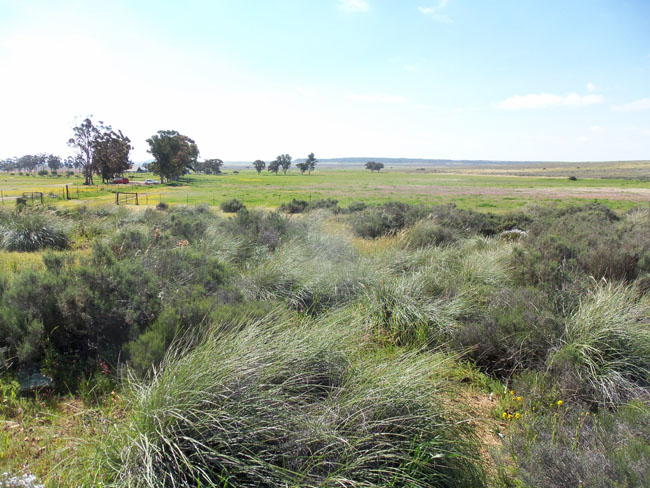 |
The leaves of the Maartblom (an Amaryllis relative which blooms in the fall, March down here). |
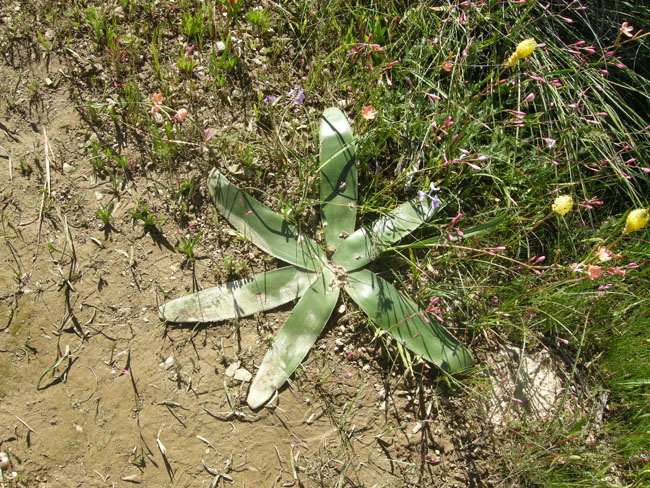 |
| The soccerball sized flower heads dry and roll around like tumble weeds. |
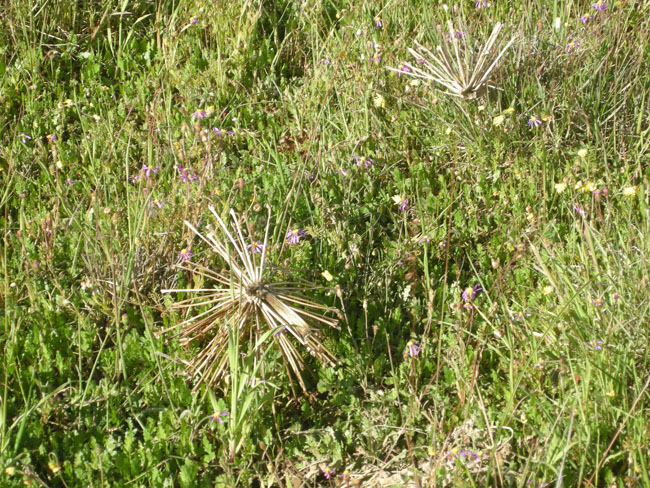 |
| Communal spiders are not something we'd heard of before. |
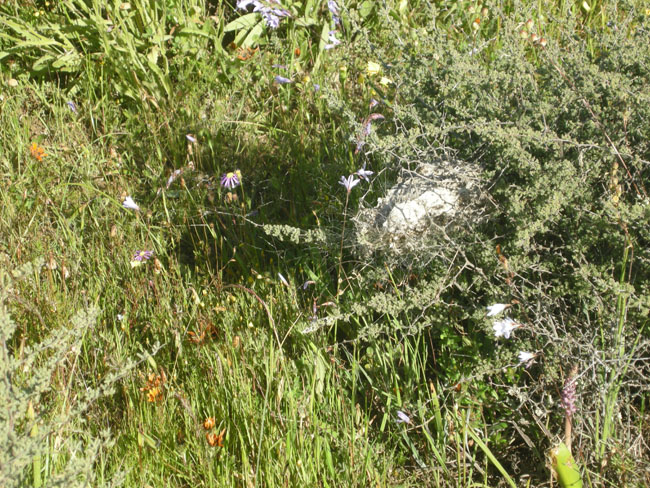 |
| So they made sure we became better educated on the species. |
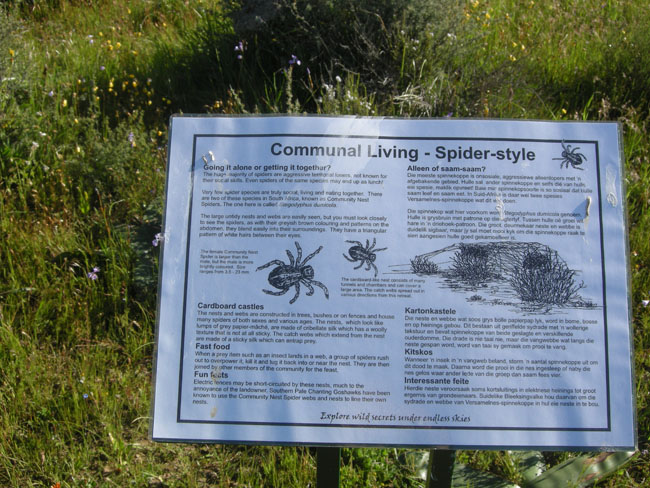 |
| We are familiar with slugs but didn't expect to find them here! |
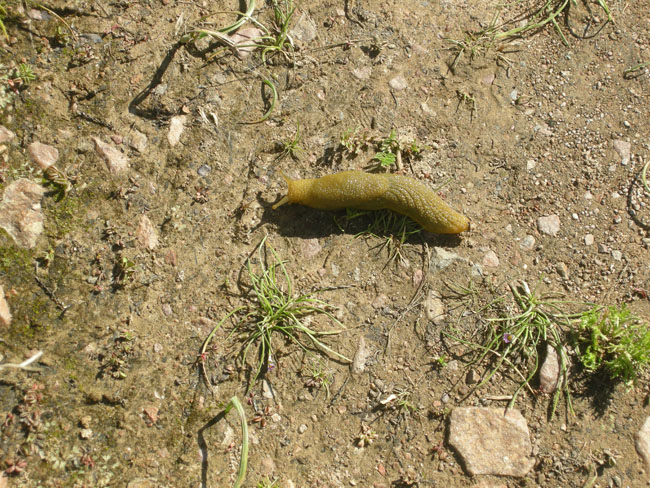 |
| The Nieuwoudtville upper falls on the Doom River. |
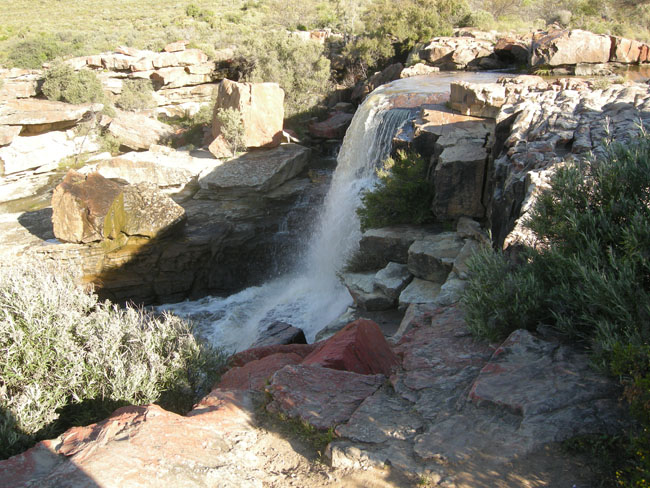 |
| ... and the lower falls for a total drop of 90 meters (295 feet). |
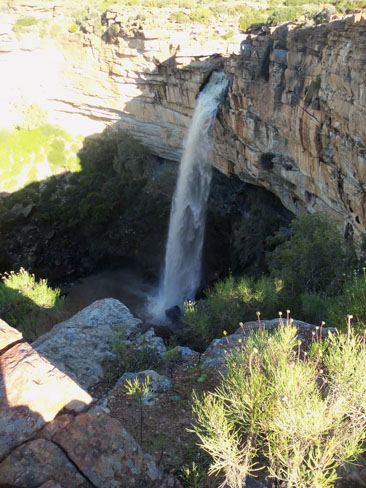 |
| A wild jade tree. |
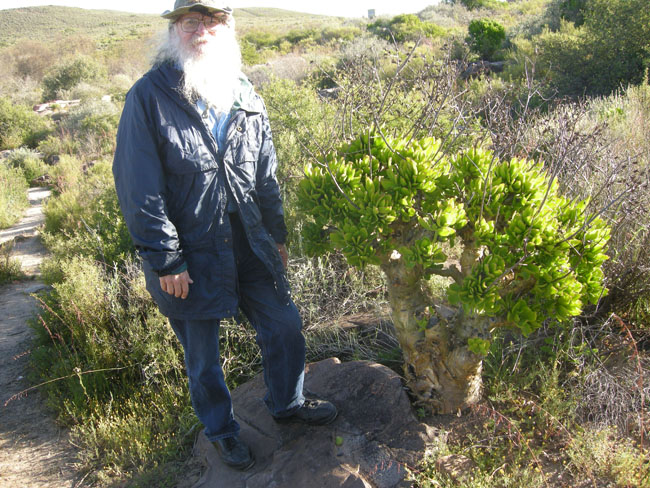 |
| and not-wild ostriches amongst the sheep. |
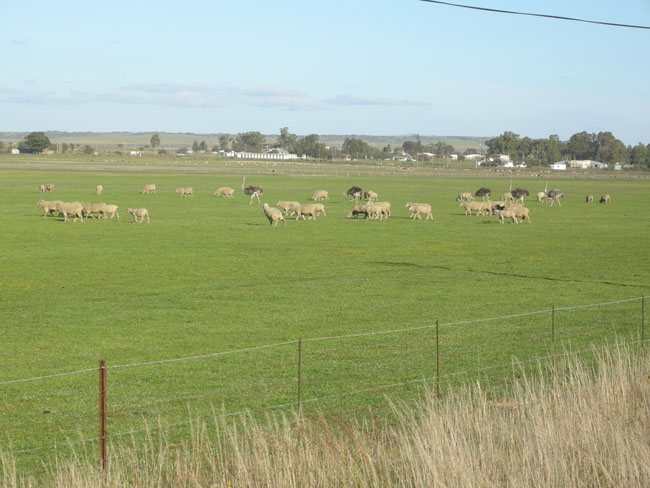 |
| The plateau's landscape was flat, with flowers. |
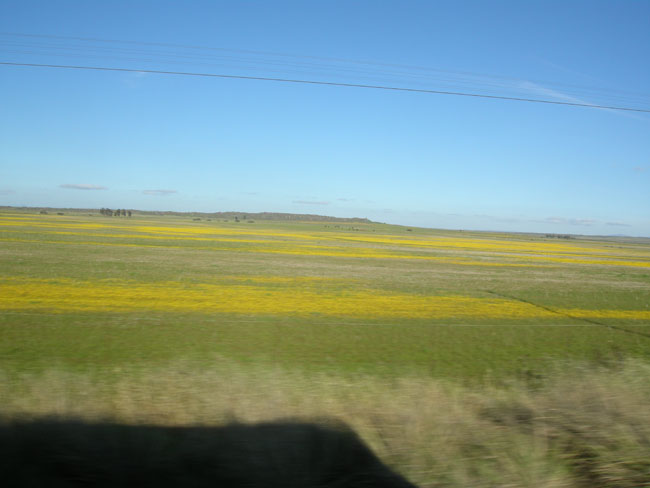 |
| Retracing our route, we dropped (hmmm...bad choice of word) back down off the plateau. The little symbol under the 70 kph sign indicates that Speed Cameras are in use on this section of the road. |
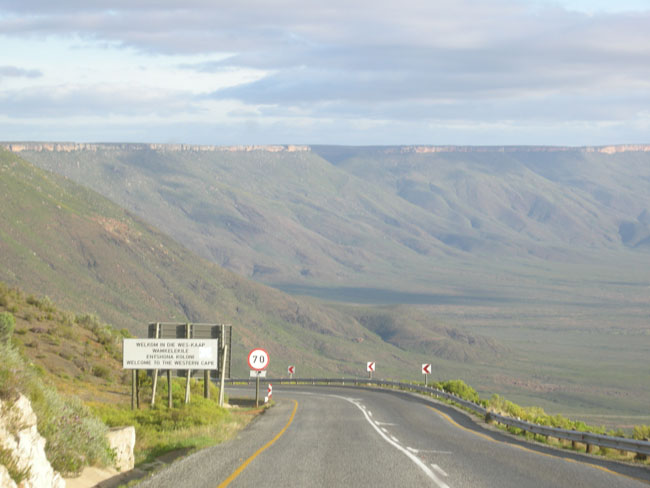 |
| After a night in Vanrhynsdorp, we continued south on the N7 past other "tables" |
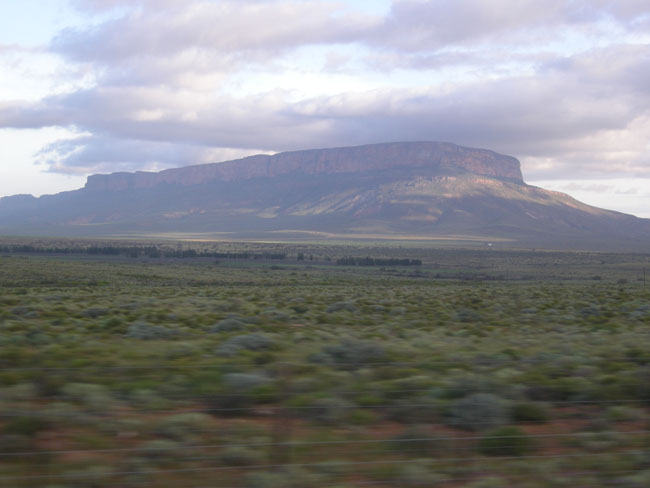 |
| some shrouded by fog |
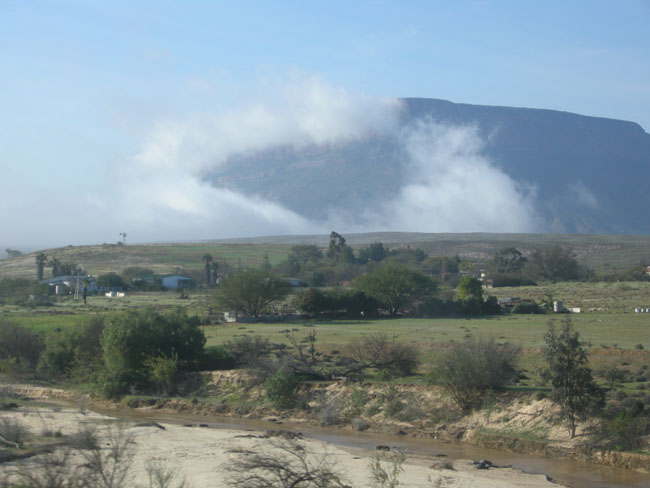 |
| This land of orchards requires irrigation |
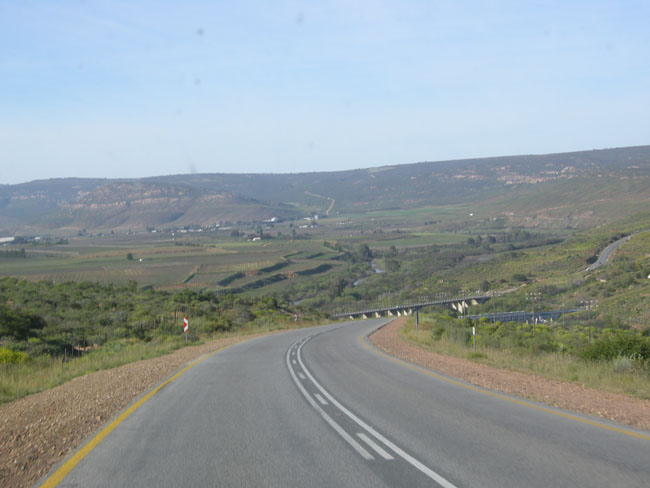 |
| But it is hard to photograph from the road. |
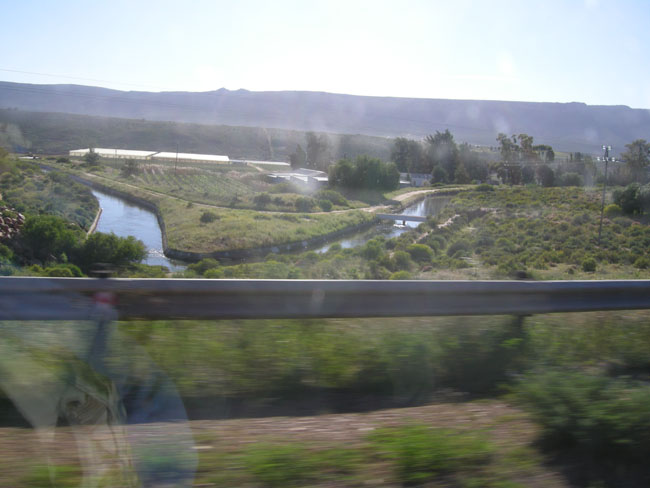 |
| Despite the crazy drivers this was the only active accident we saw: the bus snagged the truck's bumper while trying to park. Lots of folks out in the road giving advice as we pulled out of our parking spot, immediately behind the "bakkie" (pick-up truck). That could'a been our front bumper. |
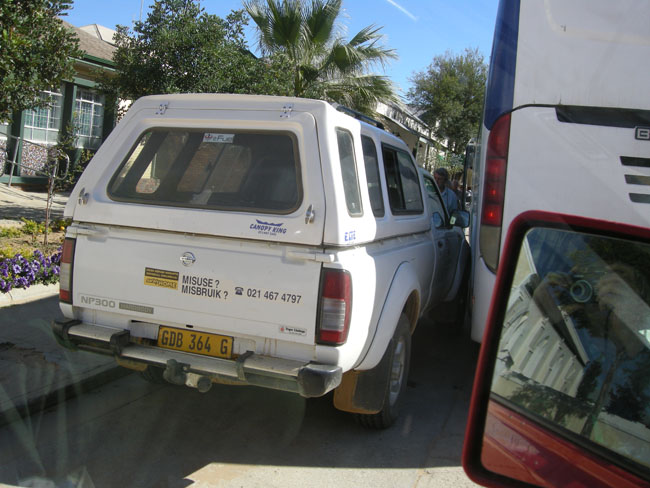 |
| We bounced back through Clanwilliam to buy groceries. But not quite at this volume. Lots of meat in this culture where everyone "braais" (what we call barbeque) |
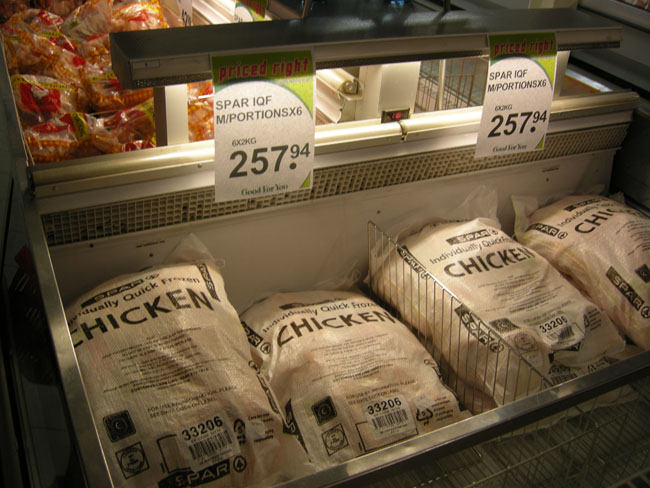 |
| The Clanwilliam Dam at the top of the lake, interrupting the Olifantsrivier. |
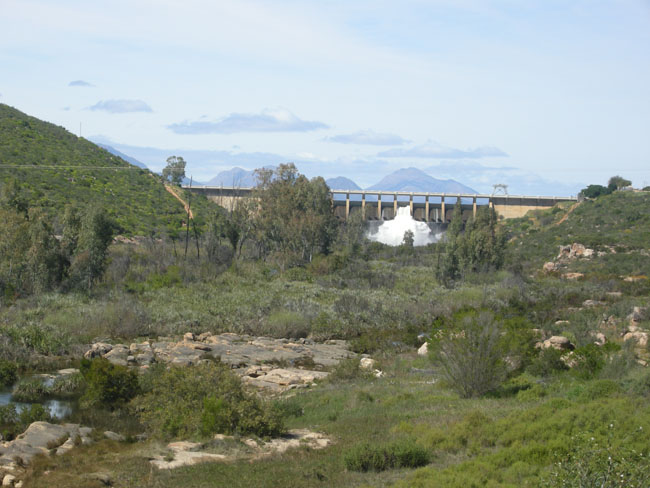 |
... and its lake, where we'd stayed the night 4 days ealier.
The Cedarberg Mountain range looms to the east of it. |
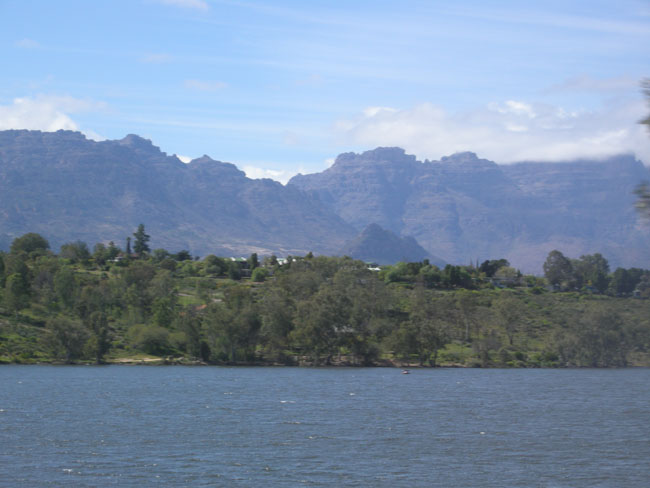 |
| Flowers were rampant along the roadside. |
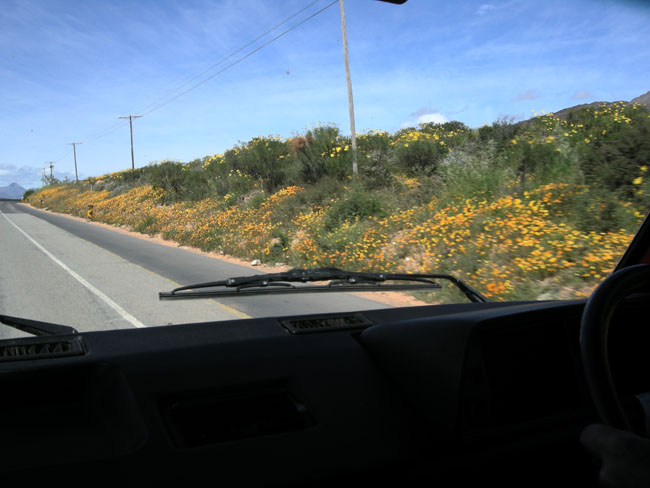 |
| Lunch at a charming place in Citrusdal ... |
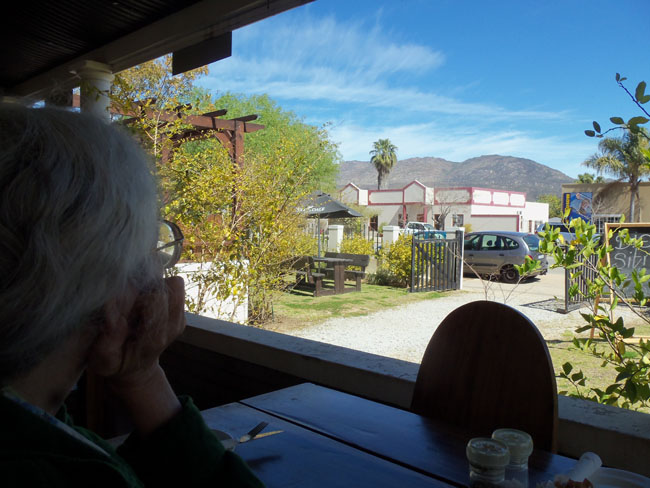 |
| ... called Die Citrus. We loved the sign and the food was good too. |
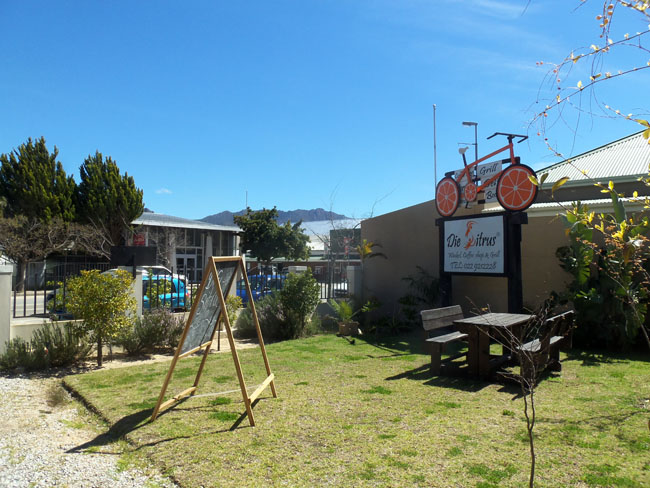 |
| Fortified by lunch we again turned east off the main road, and headed into the wilds... |
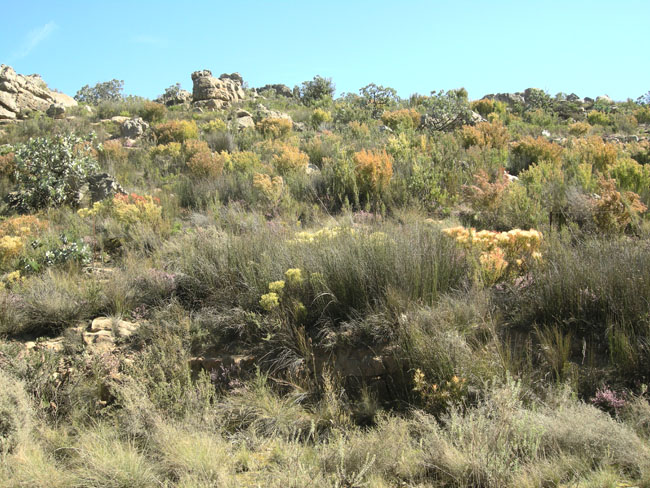 |
| ...to cross the mountains via Middelberg Pass on a relatively short, but tortuous, stretch of gravel road that was a segment of the otherwise-paved R303. |
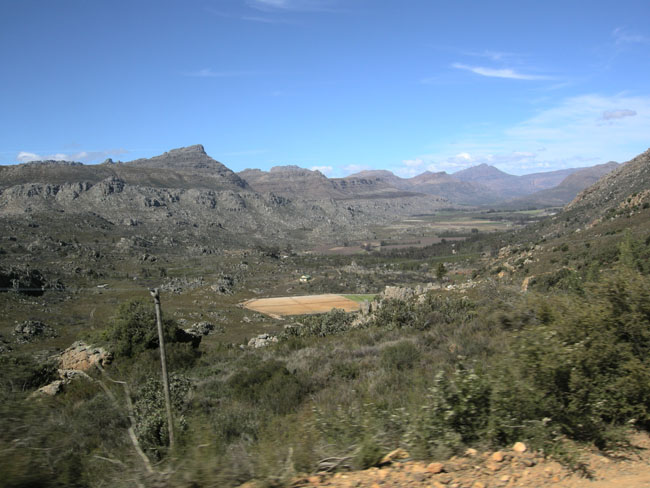 |
| We had hoped to pass between parallel ranges of the Cedarbergs by taking a rough road a bit further north ... it was listed as even more scenic. But it was flooded at both ends, and our VW rental contract specifically forbade playing in the water. |
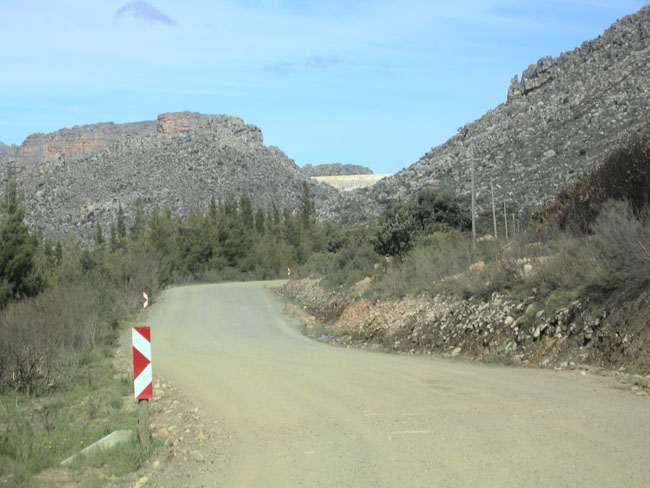 |
| But this road was quite scenic. It eventually led to oranges in a rugged valley |
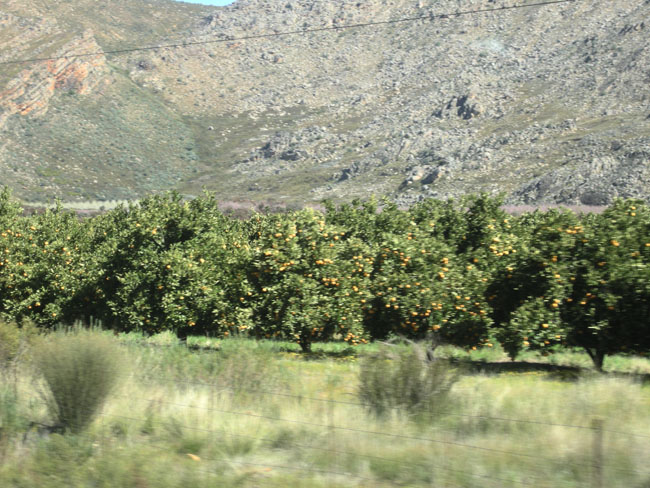 |
| with guineafowl |
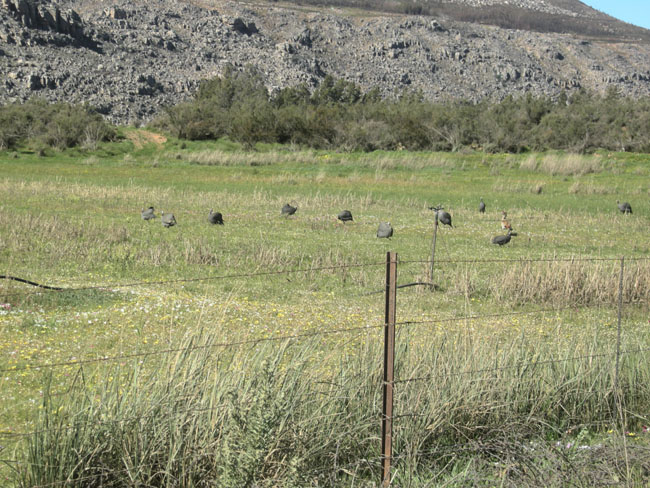 |
| and down into the more settled area one mountain range inland from Cape Town. |
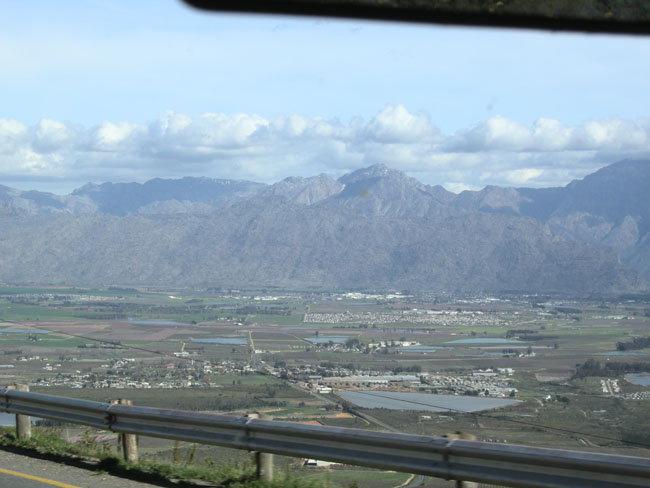 |
| We camped in the town of Ceres at the "Ceres Resort". |
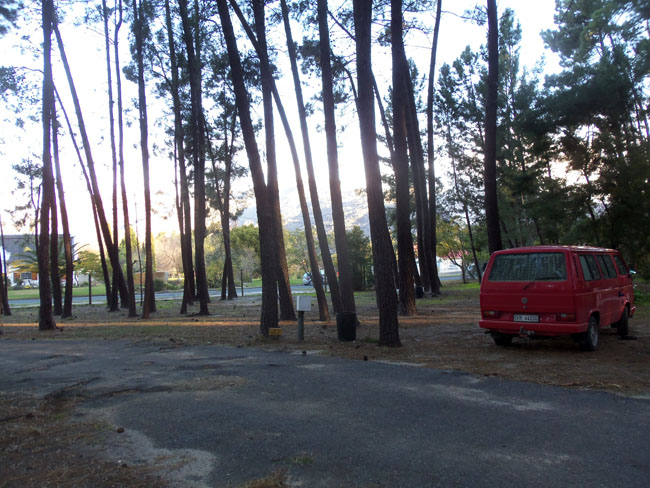 |
| It was a very different campground: much of the property was given over to trailers attached to cabins. The power drops were to boxes to plug in cords from the trailers so we assume the trailer was the kitchen. |
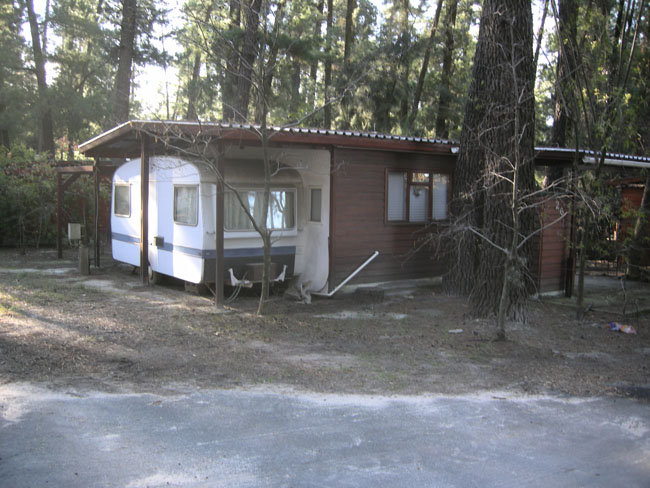 |
| Some were even more built in. Most were privately owned. |
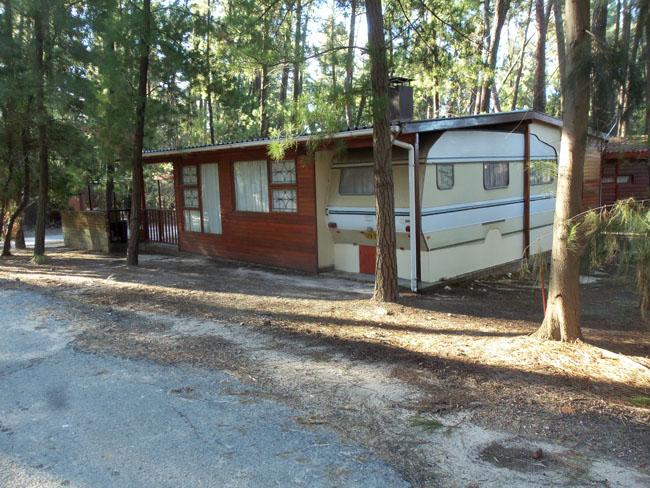 |
| Peacocks patrolled the grounds. |
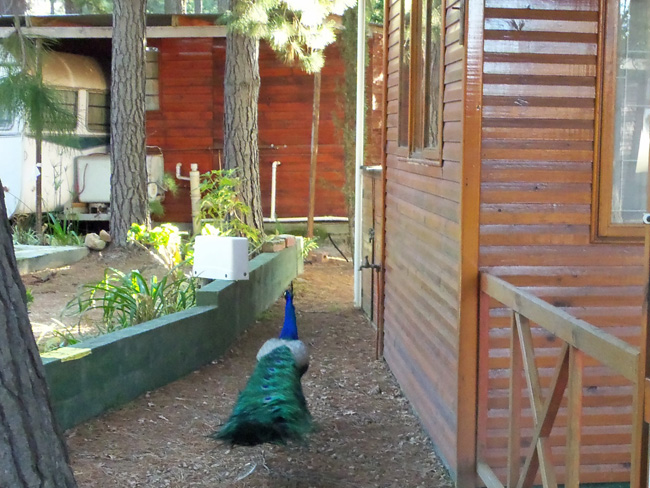 |
| Another Amaryllis with flat-to-the-ground leaves (but not the same flower as pictured in my flower book for the Maartblom we had seen so much). This is the only such flower I saw so I wonder if it was out of season. |
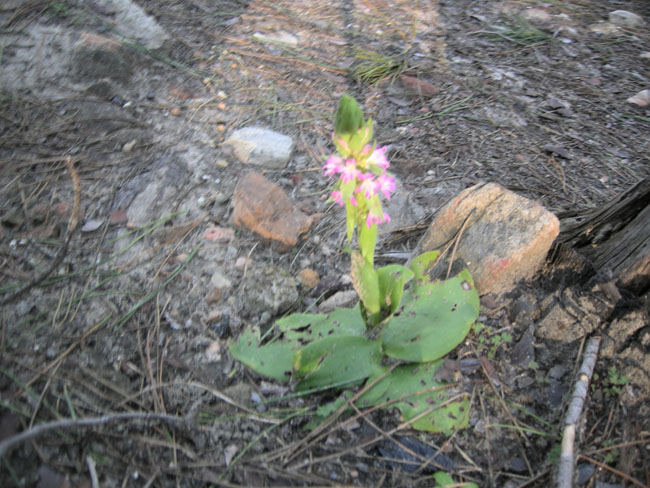 |
| A small pond in the resort was covered with these flowers, waterblommetjie. They were featured in a mutton dish we had as typical Afrikaans cooking. |
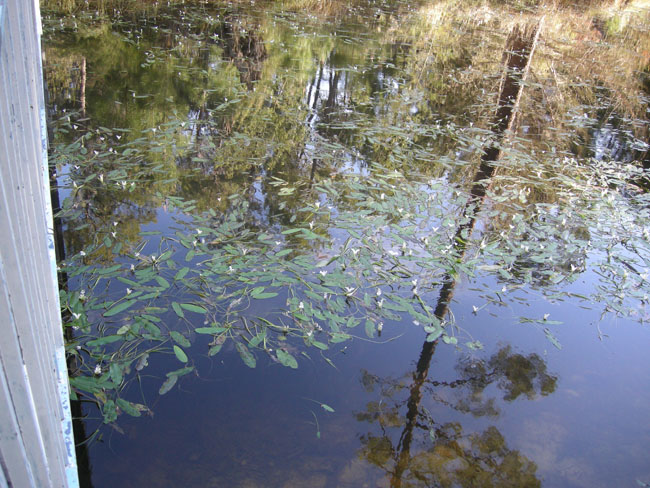 |
| At dusk, the silence was shattered by loud squawking birds in the trees. They turned out to be Egyptian geese. We had seen them in several other places -- we just now discovered that they become very loud at twilight. |
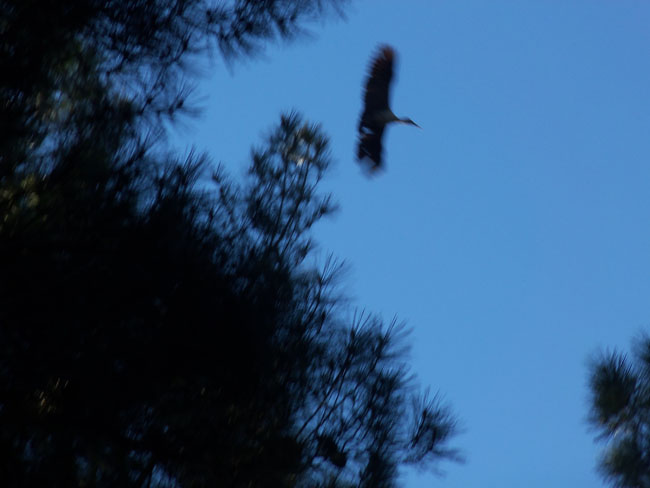 |
| The next morning, climbing westward out of Ceres on the R46, we stopped at a pull-off overlook. The Dwarsrivier with falls roared through the craggy valley below us. |
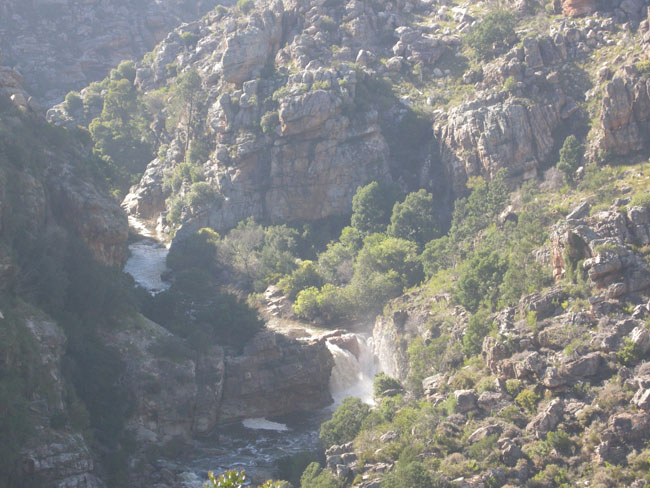 |
| We got a great view ... of where the road was leading towards Mitchell's Pass... |
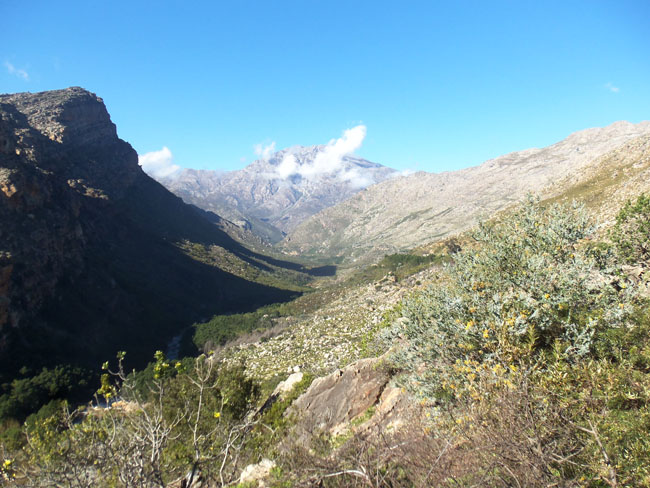 |
| And spent half an hour trying to get good photos of the multitude of "dassies" (rock hyraxes) filling the viewpoint's picnic area. |
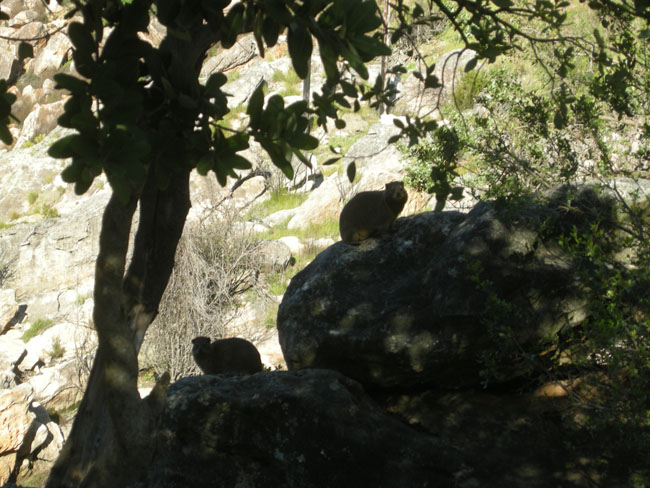 |
| Along the route we met more windmill parts marshalling their forces. This time there were all three blades waiting to get moving. Dick became quite charmed by the use of the word "Abnormal" instead of our less-fanciful "oversized". |
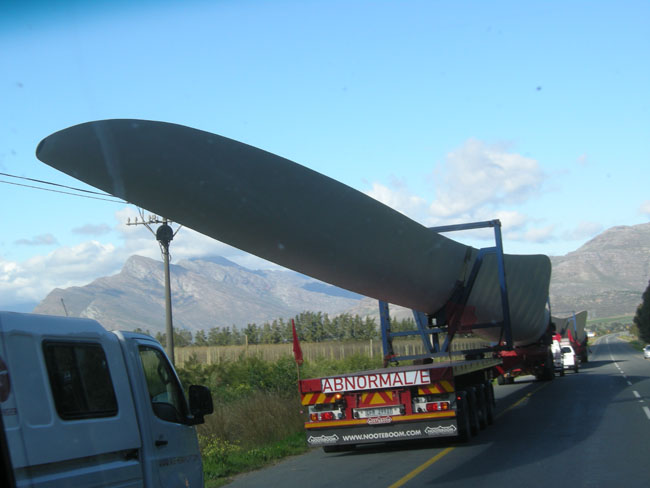 |
Above the town of Worcester (yes, pronounced like the one in Massachusetts) we next stopped at the Karoo Desert Botanical Garden, even though we were not in the desert nor the Karoo.
Through careful planning, hard work and soil conditions, they created biomes and grouping of plants found throughout the drier areas of South Africa north and east of here. |
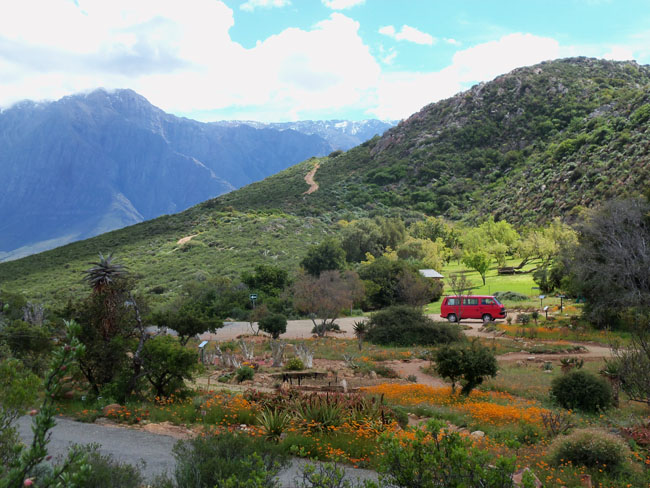 |
| More kocherboom |
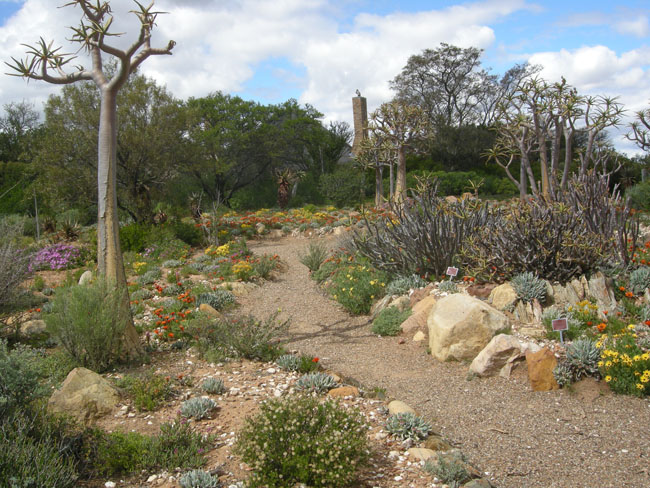 |
| and blooming aloe |
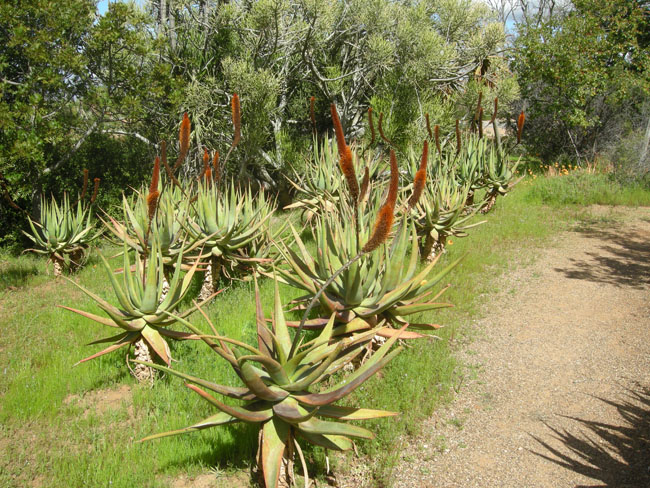 |
| plus lots more |
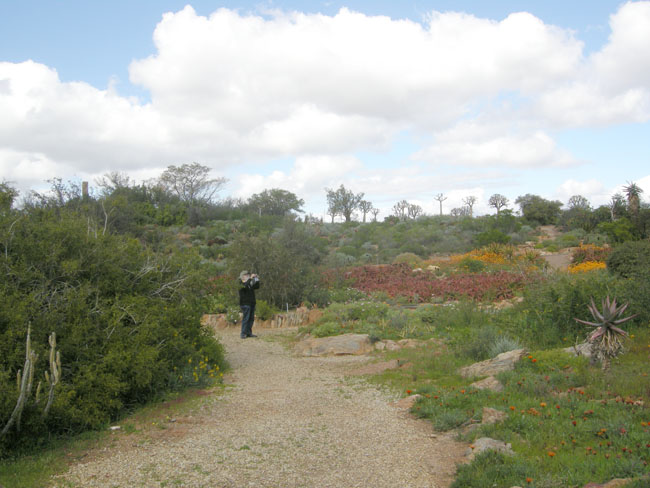 |
| even some Welwitschia growing outside! |
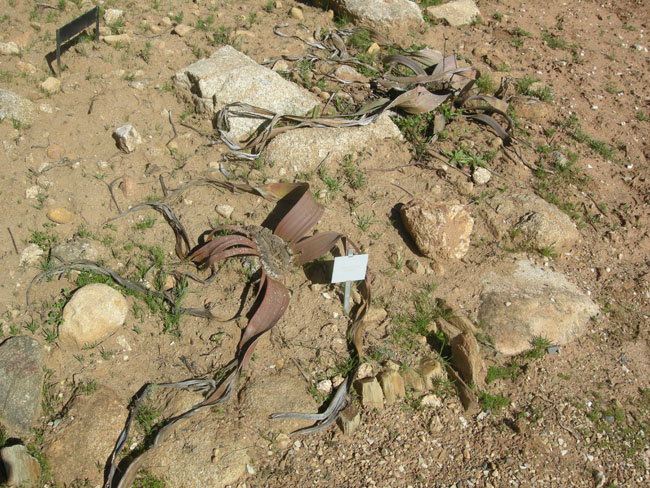 |
| And a huge euphorbia. Euphobias fill the cactus niche on this side of the world. |
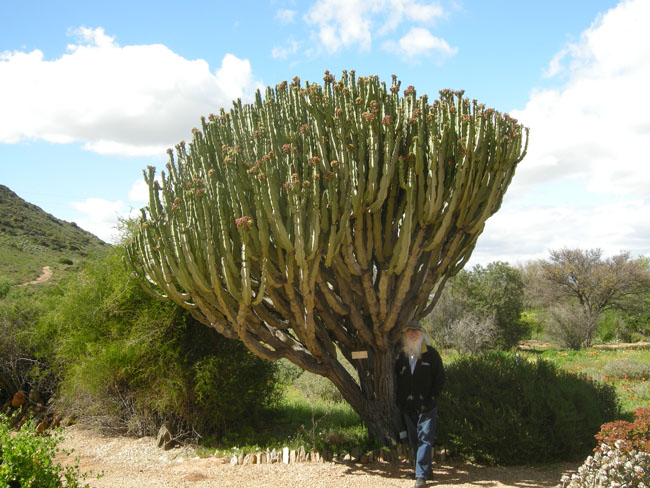 |
| Weaverbird nests |
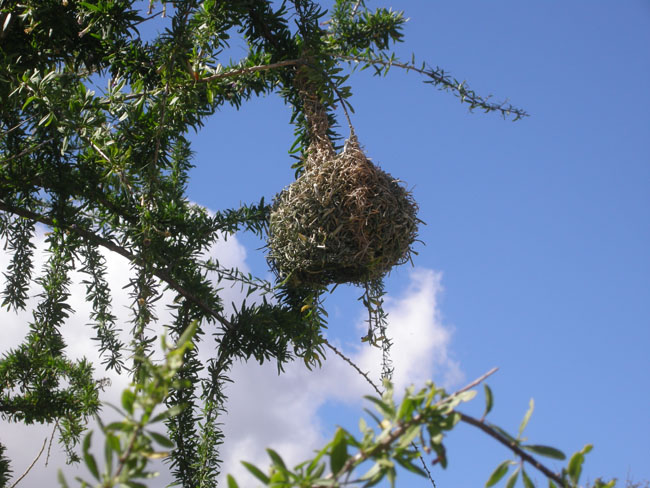 |
| And interesting rock paths. They even had a braille pathway with different foothing where the braille signs were and plants to touch. |
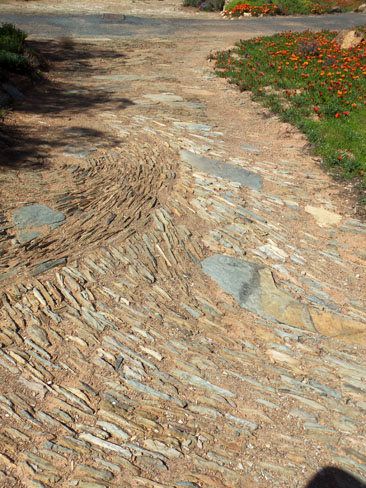 |
| A lovely plant display with lots of labels and variety. |
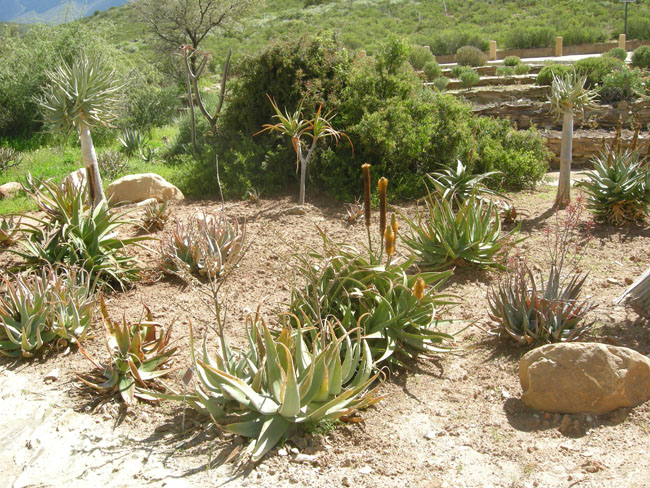 |
| |
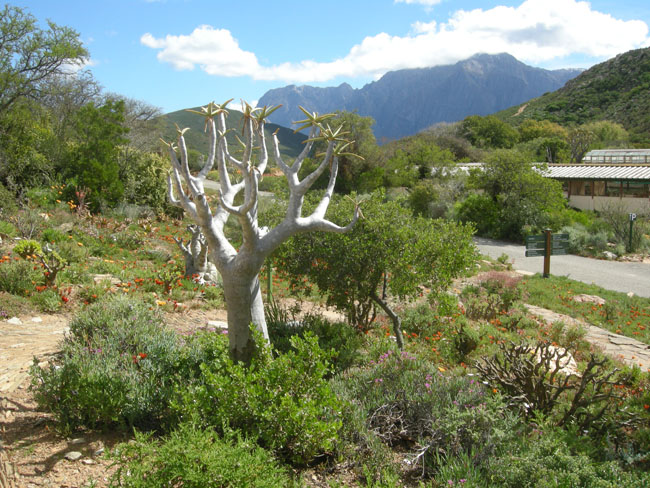 |
| Why does the phrase "hog heaven" come to mind? |
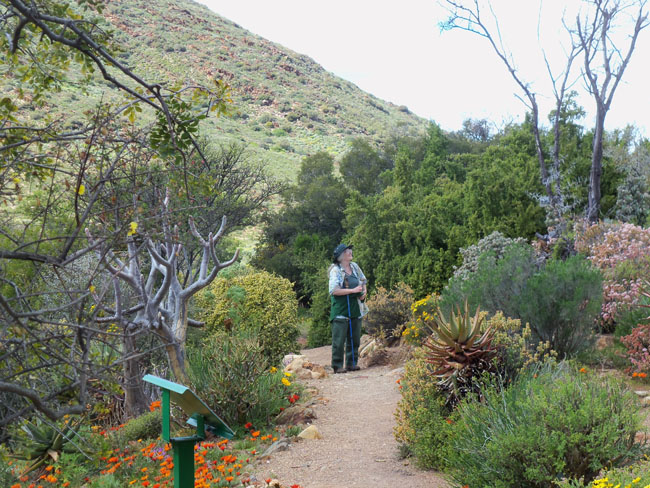 |
| |
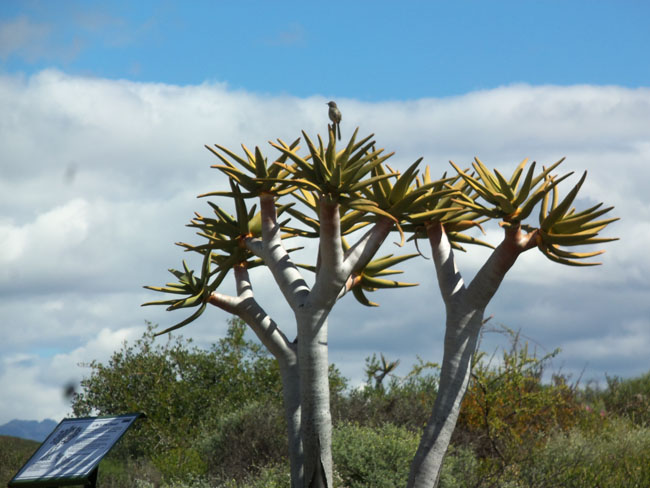 |
| Dropping into Worcester, we stopped at the Kleinplasie Living Open Air Museum which promised an restaurant serving foods reflecting Afrikaans heritage.
Remember the wasserbloom from the Ceres Resort? This is where they were brought to the table. |
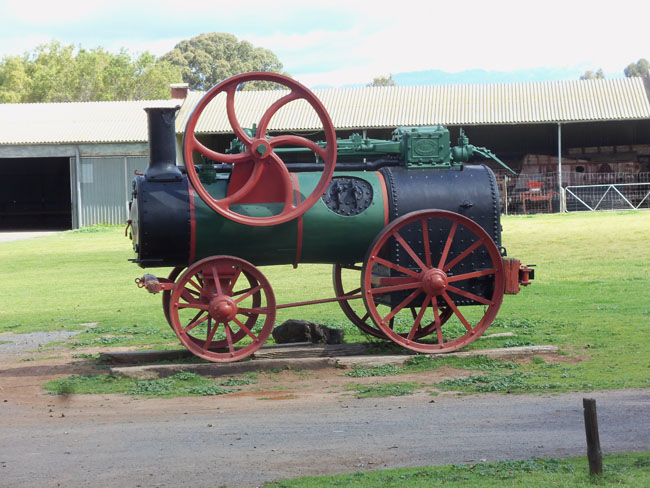 |
| The restaurant had a beautiful quilt on the wall. |
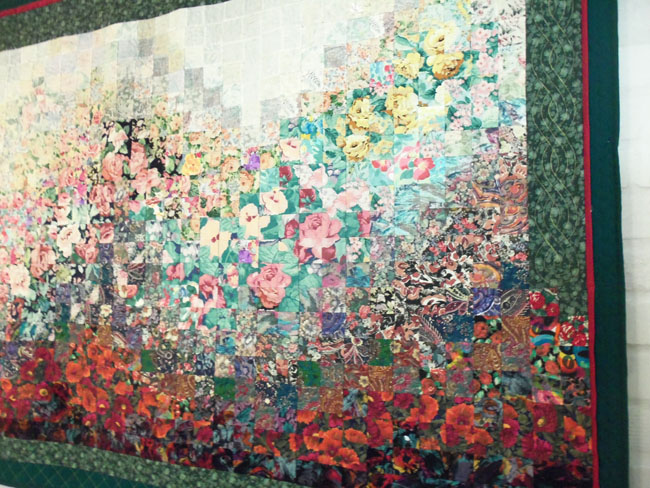 |
| And a marvelous set of fig roots in the parking lot. (Karen is always looking for complexes of roots to serve as design inspiration) |
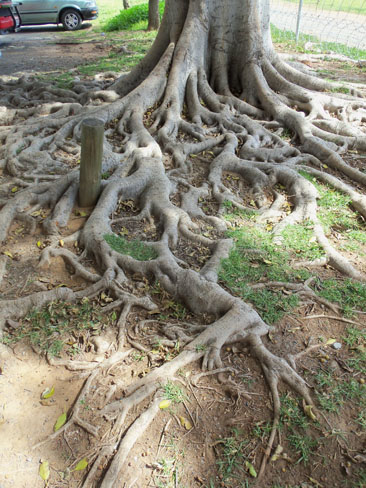 |
| Now we're on the N1, heading west towards Cape Town through lots of sedimentary layers |
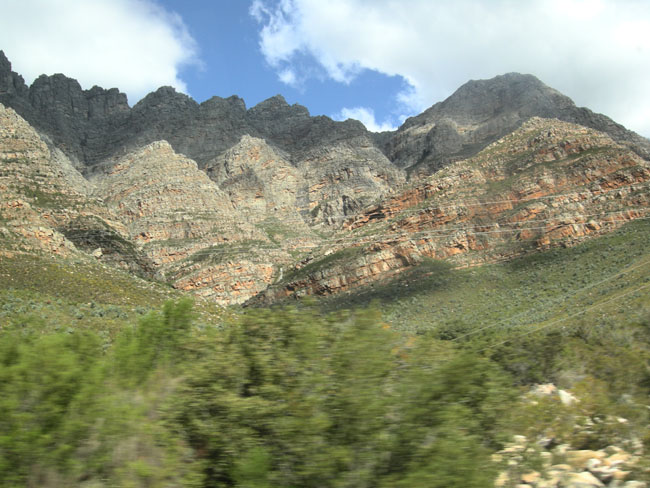 |
| We're approaching the Hawequas Mountains, pierced by the Huguenot tunnel. |
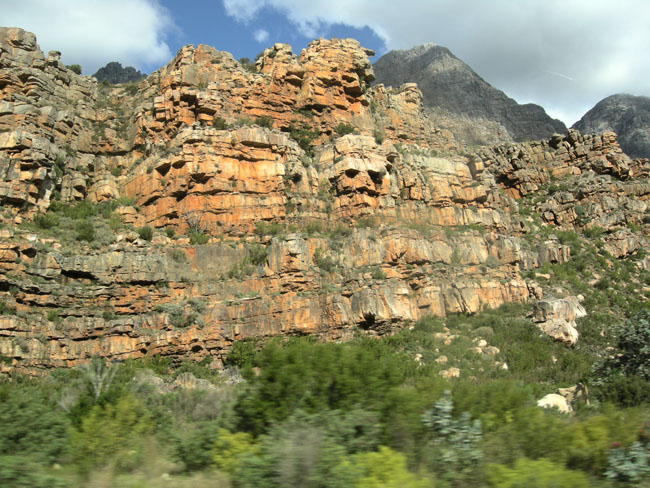 |
| We decided to forgo the tunnel and go up and over the mountains via the old road. |
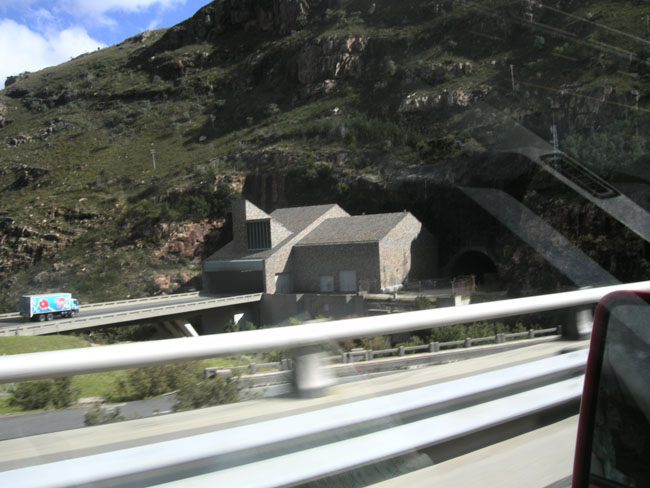 |
| It was a good choice: very little traffic and a great view of the Nederburg area just west of Paarl, only an hour's drive from Cape Town. |
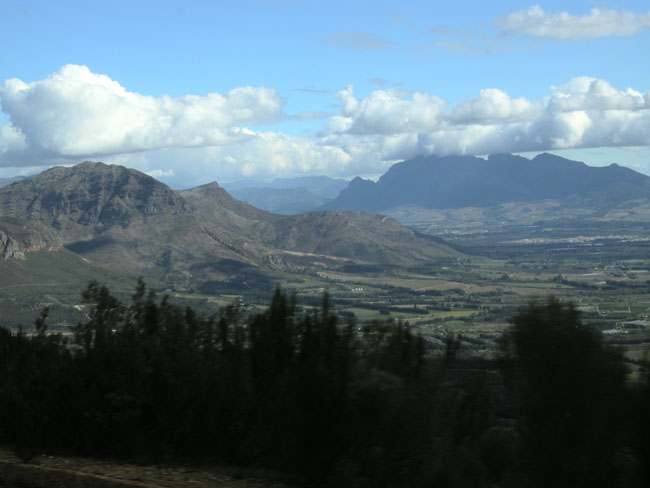 |
But we turned left on the outskirts of Paarl and headed south. As the population (and winery) density increased, the number of campgrounds diminished. Even so, we found sylvan settings at the Mountain Breeze campground just south of Stellenbosch. Yes, it was windy. This is a Yellowwood forest, with the usual off-season lack of crowding we'd come to expect.
Herein hangs two tales: one of our front turn signals had died. We'd tried replacing the bulb, but to no avail. LekkerCamper arranged to drive to our campsite and replaced the entire lamp assembly as we were finishing breakfast. Very good service.
The second tale was found in the adjacent farm's dried fruit and nuts store. Hearing our accents, the woman behind the counter asked where we were from. It turned out that she had lived in the Seattle area for a few years, but had returned to South Africa. |
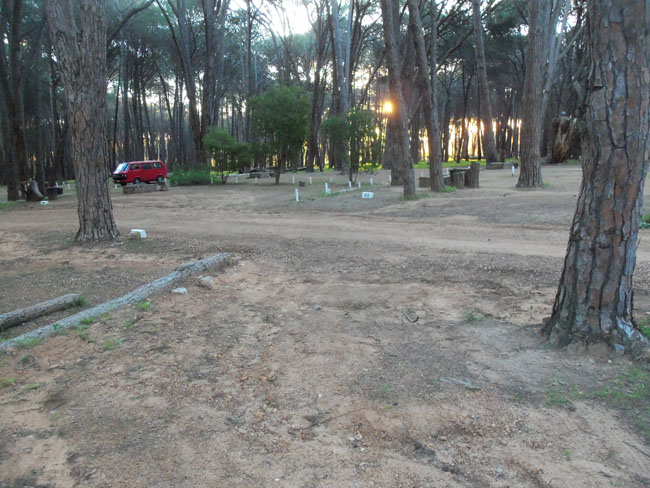 |
| In the morning we stopped by the in-city gardens at the University of Stellenbosch. |
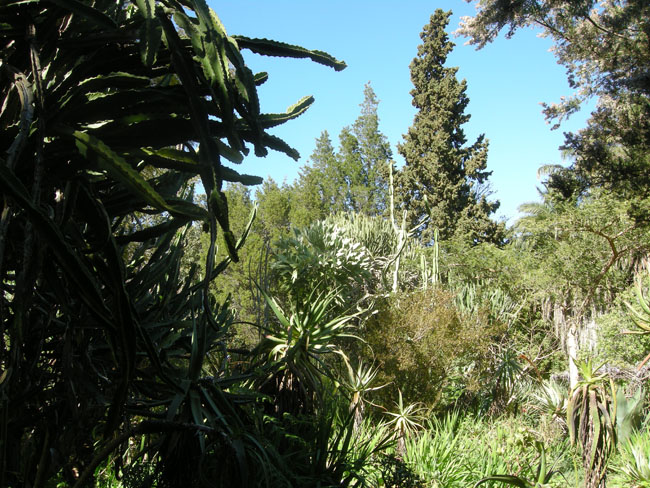 |
| A thriving, compact tour of the plants of the world crammed into half of a city block. |
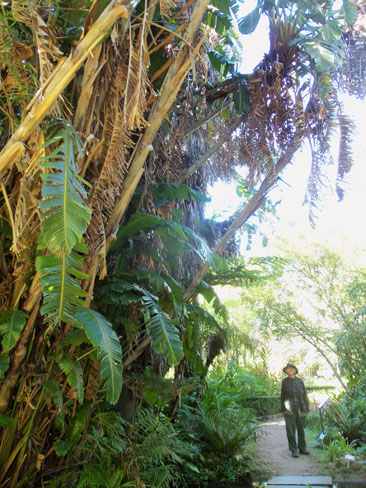 |
| With proteas |
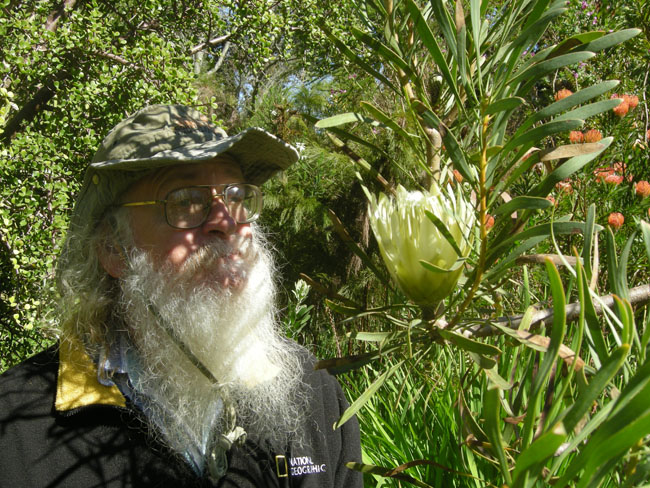 |
| |
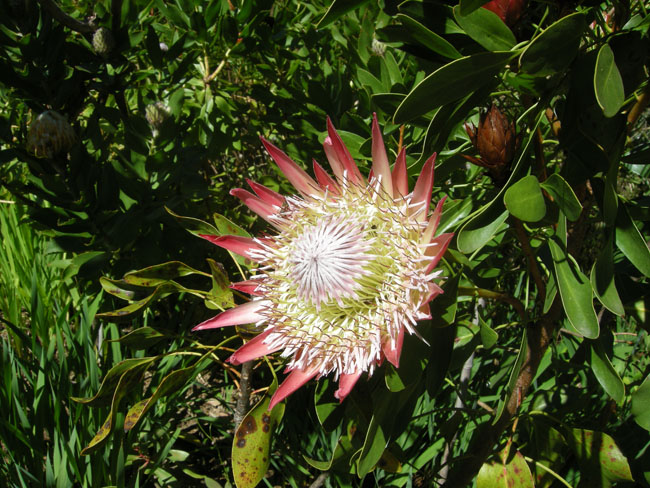 |
| And tree ferns, which we know Karen has to take photos of. |
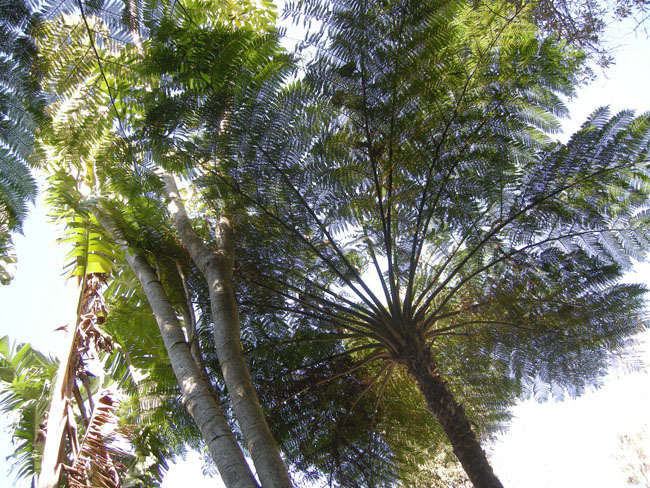 |
| |
|







































































































































































